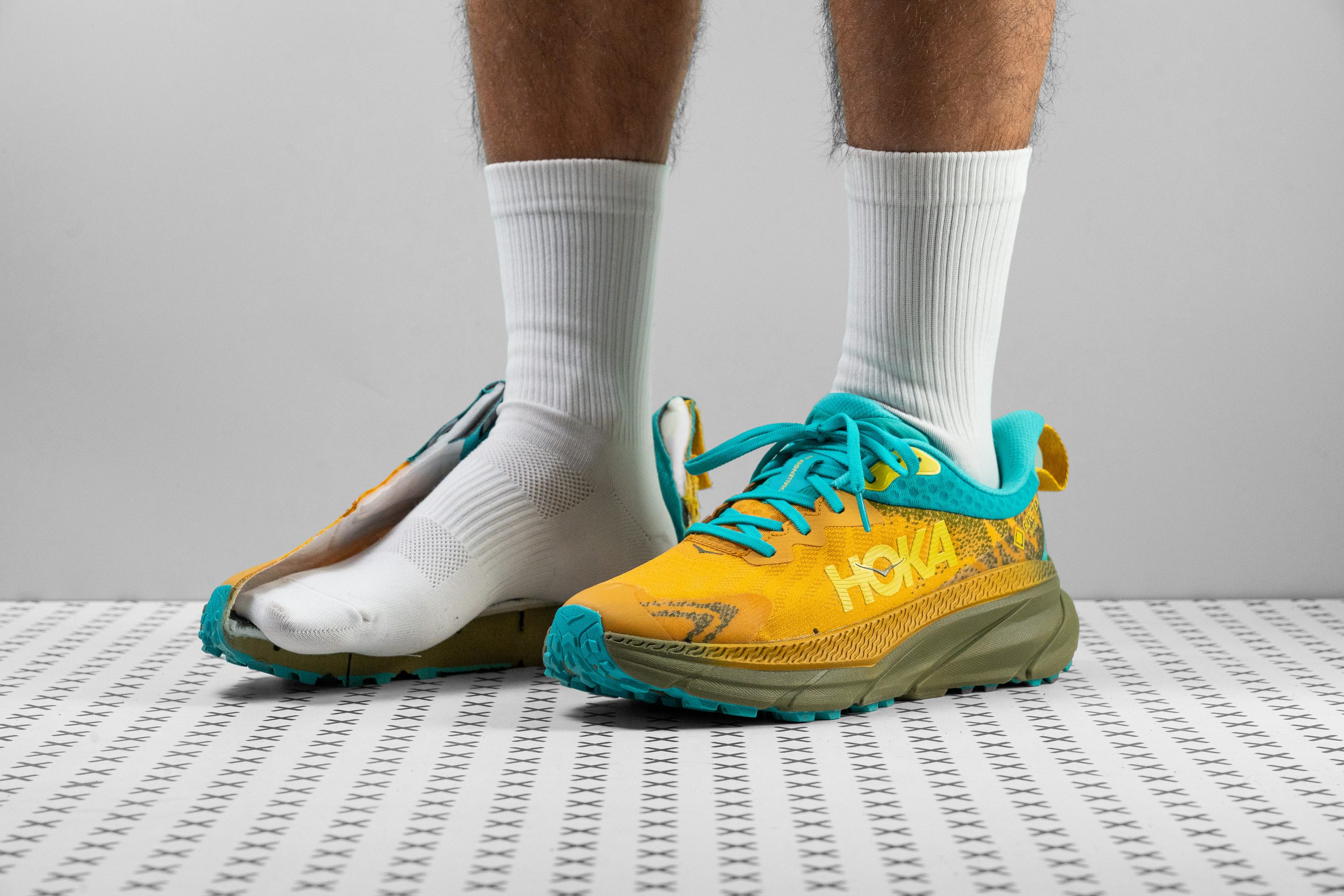Our verdict
- Top pick in best snow running shoes
Pros
- Fully waterproof and winter-ready
- Secure lockdown thanks to the gusseted tongue
- Amazing stability
- Provides a comfortable ride on roads and easy trails
- Ideal for long runs
- Generous CMEVA cushioning underfoot
- Surprisingly lightweight given its stack height
- Just $15 more than the regular version
Cons
- Lacks reflective elements
- Potentially too stiff for hiking for some users
- Higher heel-to-toe drop than anticipated
- Ultra-tapered toebox
Audience verdict
Comparison
The most similar running shoes compared
+ + Add a shoe | |||||
|---|---|---|---|---|---|
| Audience score | 78 Decent! | 81 Good! | 92 Superb! | 87 Great! | |
| Price | $160 | $170 | $150 | $165 | |
| Trail terrain | ModerateTechnical | ModerateTechnical | ModerateTechnical | Technical | |
| Shock absorption | - | - | Moderate | - | |
| Energy return | - | - | Moderate | - | |
| Arch support | Neutral | Neutral | Neutral | Neutral | |
| Weight lab Weight brand | 9.9 oz / 281g 9 oz / 255g | 10.4 oz / 296g 10.7 oz / 303g | 9.9 oz / 282g 9.7 oz / 275g | 11.5 oz / 325g 11.6 oz / 328g | |
| Drop lab Drop brand | 11.1 mm 5.0 mm | 11.6 mm 6.0 mm | 9.0 mm 8.0 mm | 11.2 mm 10.0 mm | |
| Strike pattern | Heel | Heel | HeelMid/forefoot | Heel | |
| Size | True to size | True to size | True to size | True to size | |
| Midsole softness | Soft | Balanced | Balanced | Firm | |
| Difference in midsole softness in cold | Small | Small | Small | Small | |
| Plate | ✗ | Rock plate | ✗ | ✗ | |
| Toebox durability | Very good | Good | Good | Good | |
| Heel padding durability | Decent | Bad | Good | Good | |
| Outsole durability | Good | Decent | Decent | Decent | |
| Breathability | Warm | Warm | Moderate | Warm | |
| Width / fit | Medium | Narrow | Medium | Medium | |
| Toebox width | Narrow | Medium | Medium | Medium | |
| Stiffness | Stiff | Stiff | Moderate | Stiff | |
| Torsional rigidity | Stiff | Stiff | Moderate | Stiff | |
| Heel counter stiffness | Stiff | Stiff | Stiff | Stiff | |
| Lug depth | 3.8 mm | 4.4 mm | 4.0 mm | 5.0 mm | |
| Heel stack lab Heel stack brand | 39.2 mm 31.0 mm | 37.3 mm 39.0 mm | 33.5 mm 33.0 mm | 37.0 mm 32.0 mm | |
| Forefoot lab Forefoot brand | 28.1 mm 26.0 mm | 25.7 mm 33.0 mm | 24.5 mm 25.0 mm | 25.8 mm 22.0 mm | |
| Widths available | Normal | Normal | Normal | Normal | |
| Season | Winter | Winter | All seasons | Winter | |
| Removable insole | ✓ | ✓ | ✓ | ✓ | |
| Orthotic friendly | ✓ | ✓ | ✓ | ✓ | |
| Waterproofing | WaterproofWater repellent | Waterproof | Water repellent | Waterproof | |
| Ranking | #344 Bottom 10% | #315 Bottom 17% | #14 Top 4% | #165 Top 44% | |
| Popularity | #136 Top 36% | #179 Top 47% | #226 Bottom 40% | #120 Top 32% |
Who should buy
We think the Hoka Challenger 7 GTX is an outstanding choice for:
- Hoka enthusiasts looking for a versatile, waterproof door-to-trail running shoe.
- Runners with narrow-to-medium width feet seeking a reliable Gore-Tex shoe for their rotation.
- Fans of the Hoka Challenger series who desire a more durable option for just an extra $15.
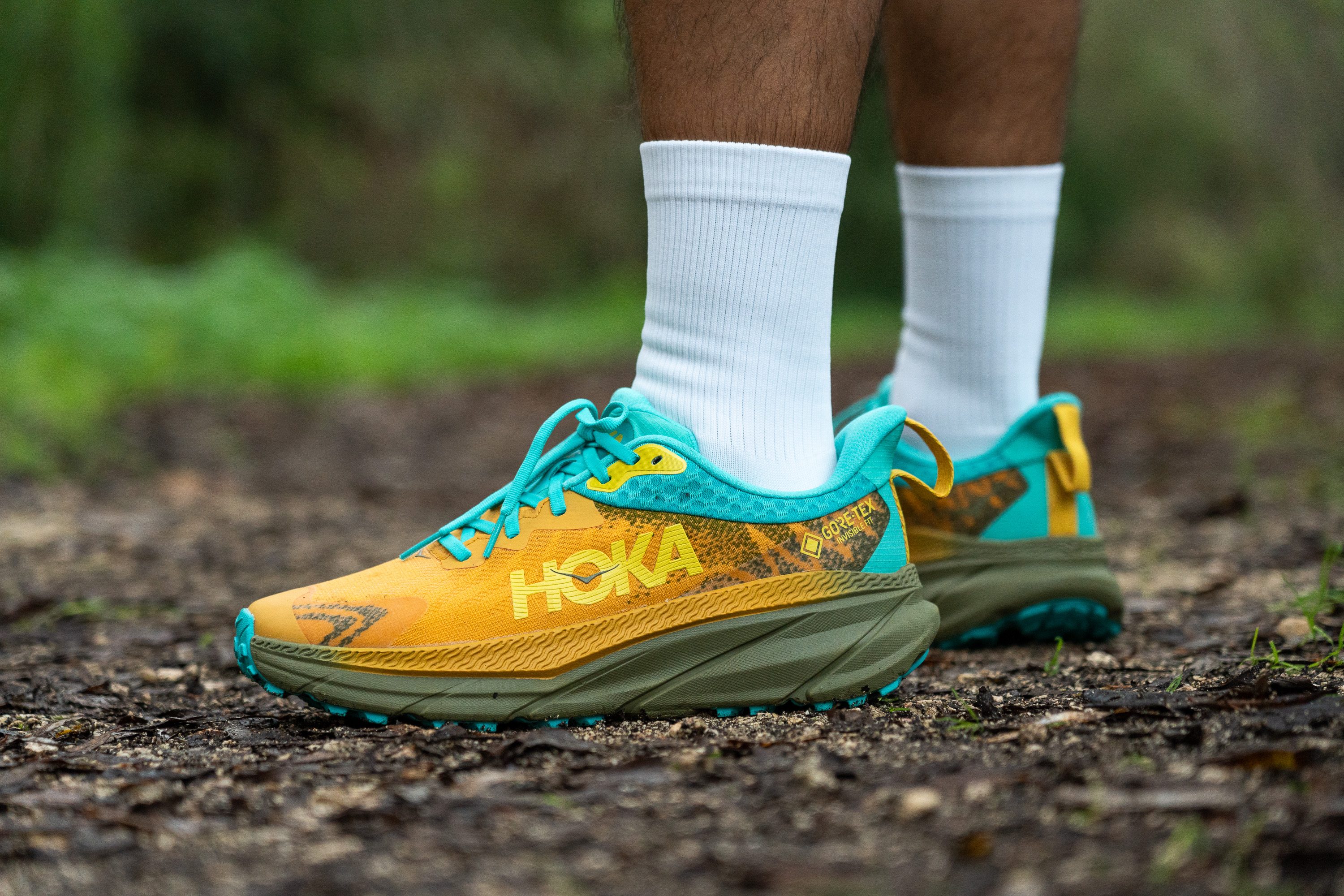
Who should NOT buy
If you have wide feet, the Challenger 7 GTX might not be the best fit, as its toebox, particularly around the toe area, is really narrow based on our lab tests. Luckily, we found that alternatives like the Nike Pegasus Trail 4 GTX provide ample room for toe splay and the same Gore-Tex membrane.
Also, the Challenger isn't the top Gore-Tex shoe if you're more trail-focused than road. In such cases, we suggest the Speedgoat 5 GTX, which boasts an impressive Vibram outsole and greater agility for various trails, not just the easy ones.
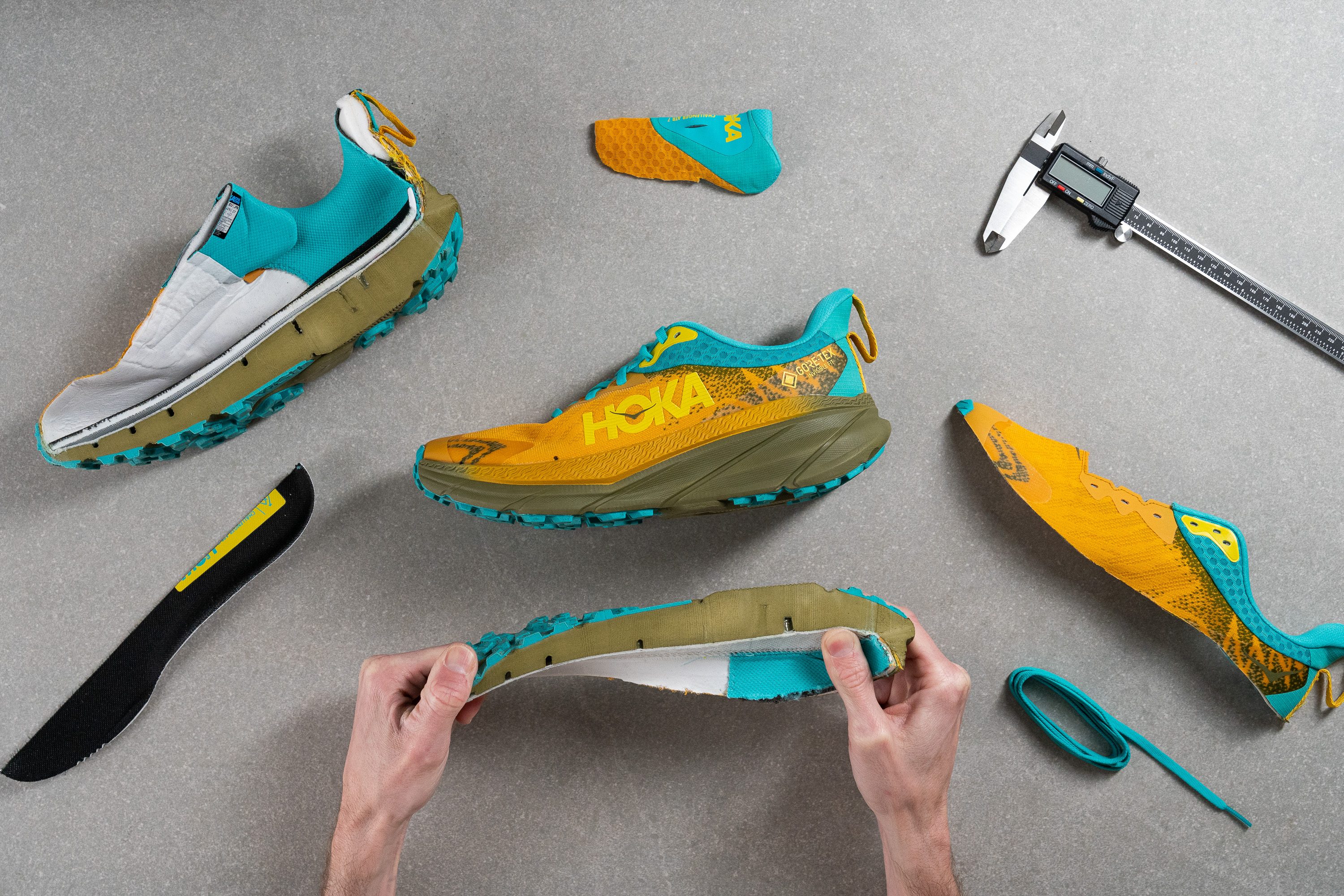
Cushioning
Heel stack
If you're searching for a maximalist and versatile shoe, there aren't many options like the Challenger 7 GTX.
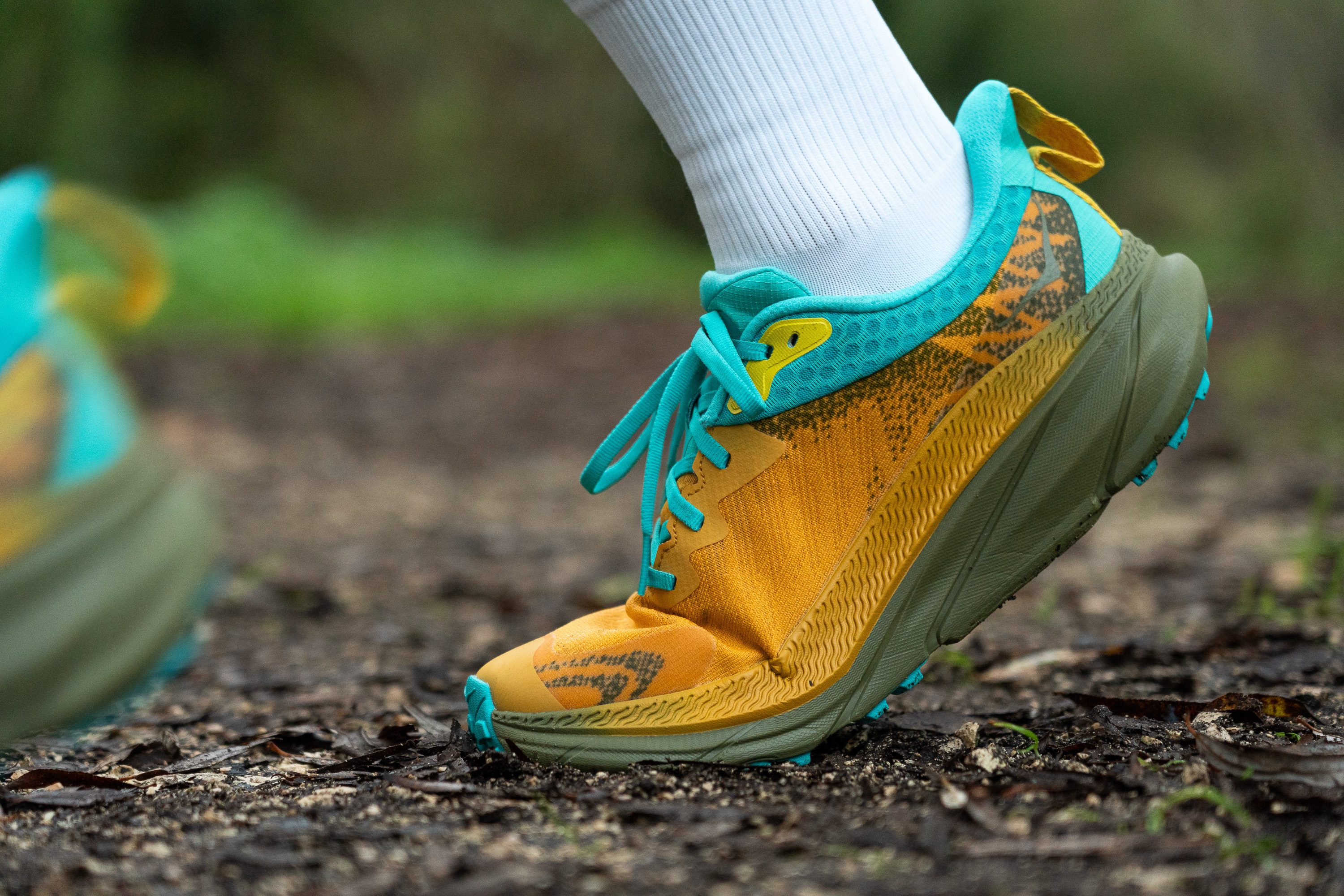
With 39.2 mm of CMEVA foam in the heel, it offers heavy cushioning and guarantees exceptional comfort during long runs for every runner, including those who are extreme heel strikers.
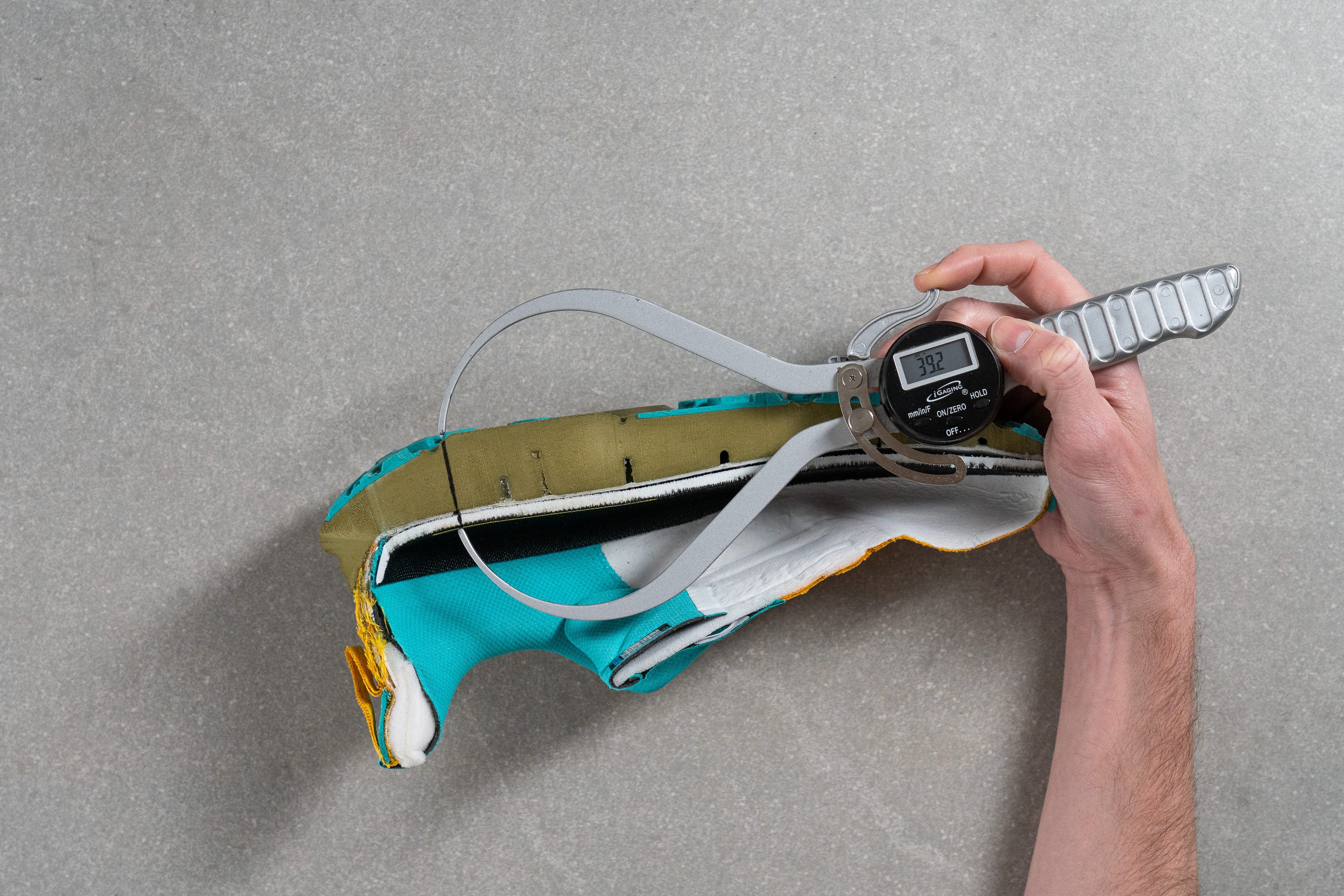
| Hoka Challenger 7 GTX | 39.2 mm |
| Average | 32.6 mm |
Forefoot stack
In the forefoot, our precise measurement showed a stack height of 28.1 mm, higher than what's typical in trail running shoes, again emphasizing comfort for long runs.
However, runners who prefer a strong ground feel on trails might find this disappointing and might be better off with a less cushioned shoe.
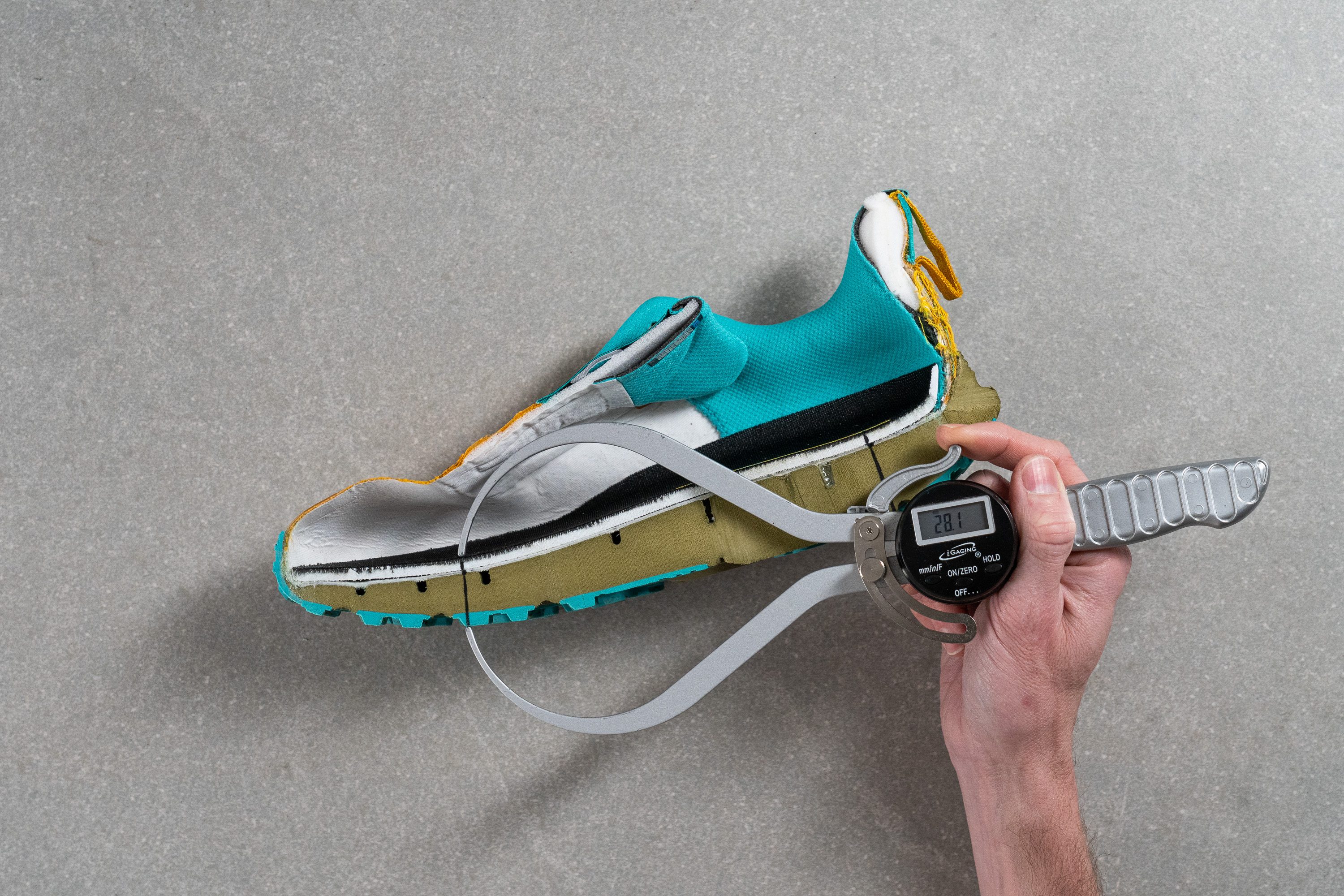
| Hoka Challenger 7 GTX | 28.1 mm |
| Average | 25.1 mm |
Drop
Our results lead to a massive 11.1 mm heel-to-toe drop, a big shift from the 5-mm drop Hoka claims. We frequently find this brand's measurements significantly different from ours.
Why the difference? We measure every shoe following World Athletics guidelines, but many brands don't adhere to these standards...
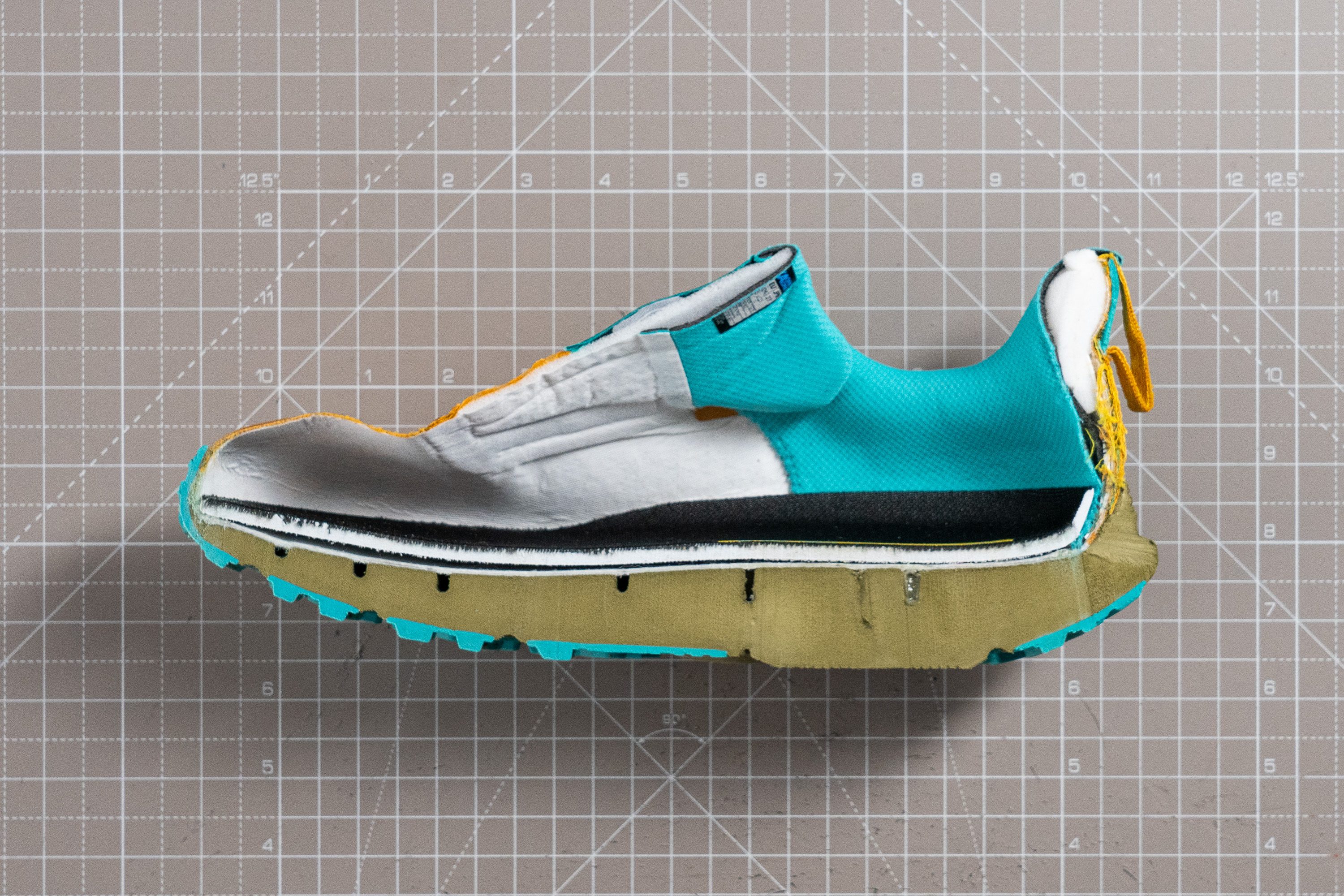
| Hoka Challenger 7 GTX | 11.1 mm |
| Average | 7.6 mm |
Midsole softness
In the midsole, we encountered Hoka's familiar CMEVA foam, commonly used in many of their road running shoes.
This foam may not offer the plush ride found in other Hokas, but it provides a more harmonious balance. That's a major plus in our view for a hybrid shoe designed to perform well in any environment.
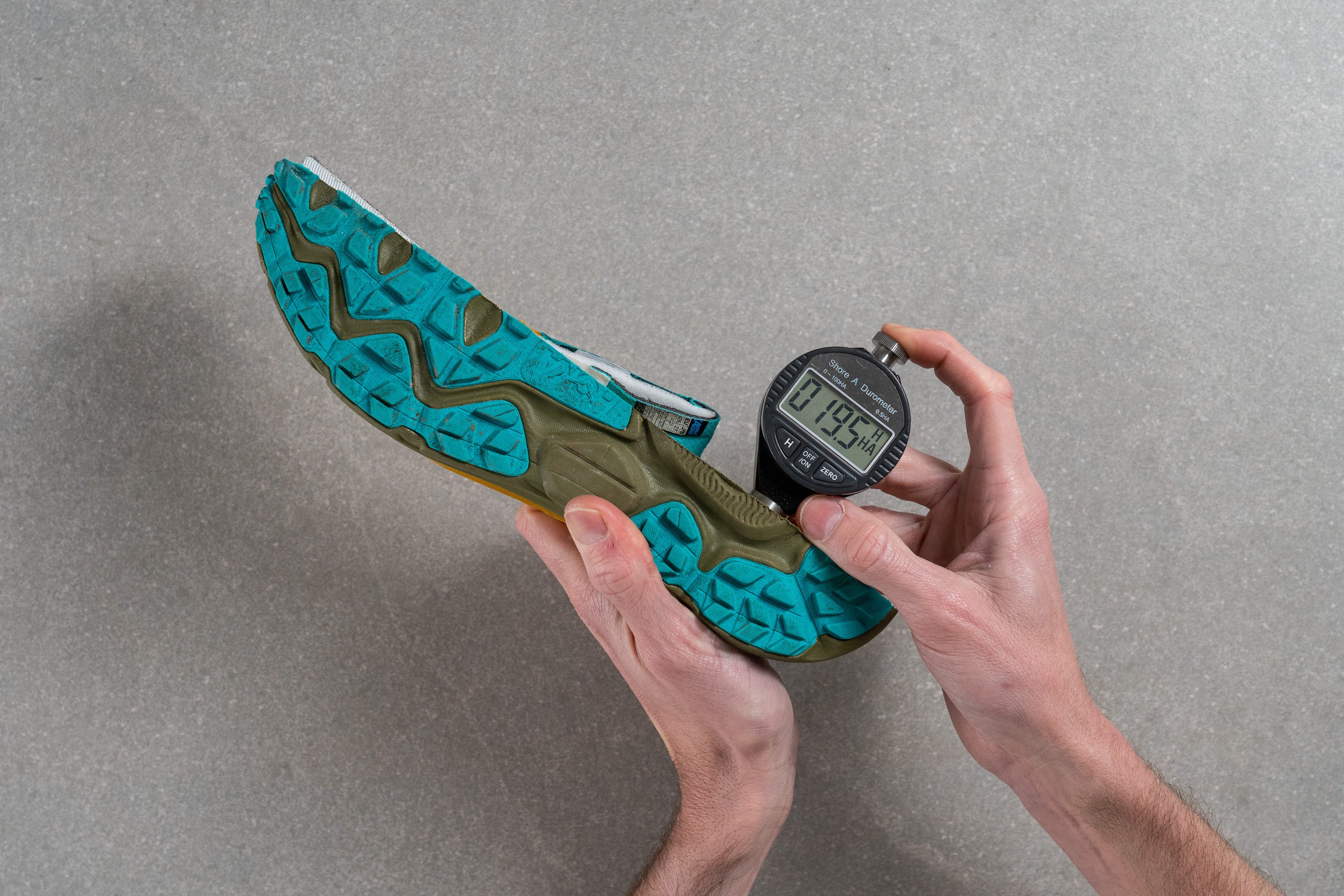
| Hoka Challenger 7 GTX | 19.5 HA |
| Average | 22.0 HA |
Size and fit
Size
Hoka Challenger 7 GTX fits true to size (130 votes).
Internal length
| Hoka Challenger 7 GTX | 271.6 mm |
| Average | 269.0 mm |
Width / Fit
One common worry among some Hoka runners is the width of the shoe, as they often design uppers that are too narrow for the average foot. This is where we at RunRepeat step in to assist by taking precise measurements of each shoe and comparing them.
For the Challenger 7 GTX, the upper measures 97.0 mm at its widest part— slightly above average and theoretically a perfect fit for those with normal feet—but we cannot claim victory until completing all measurements.
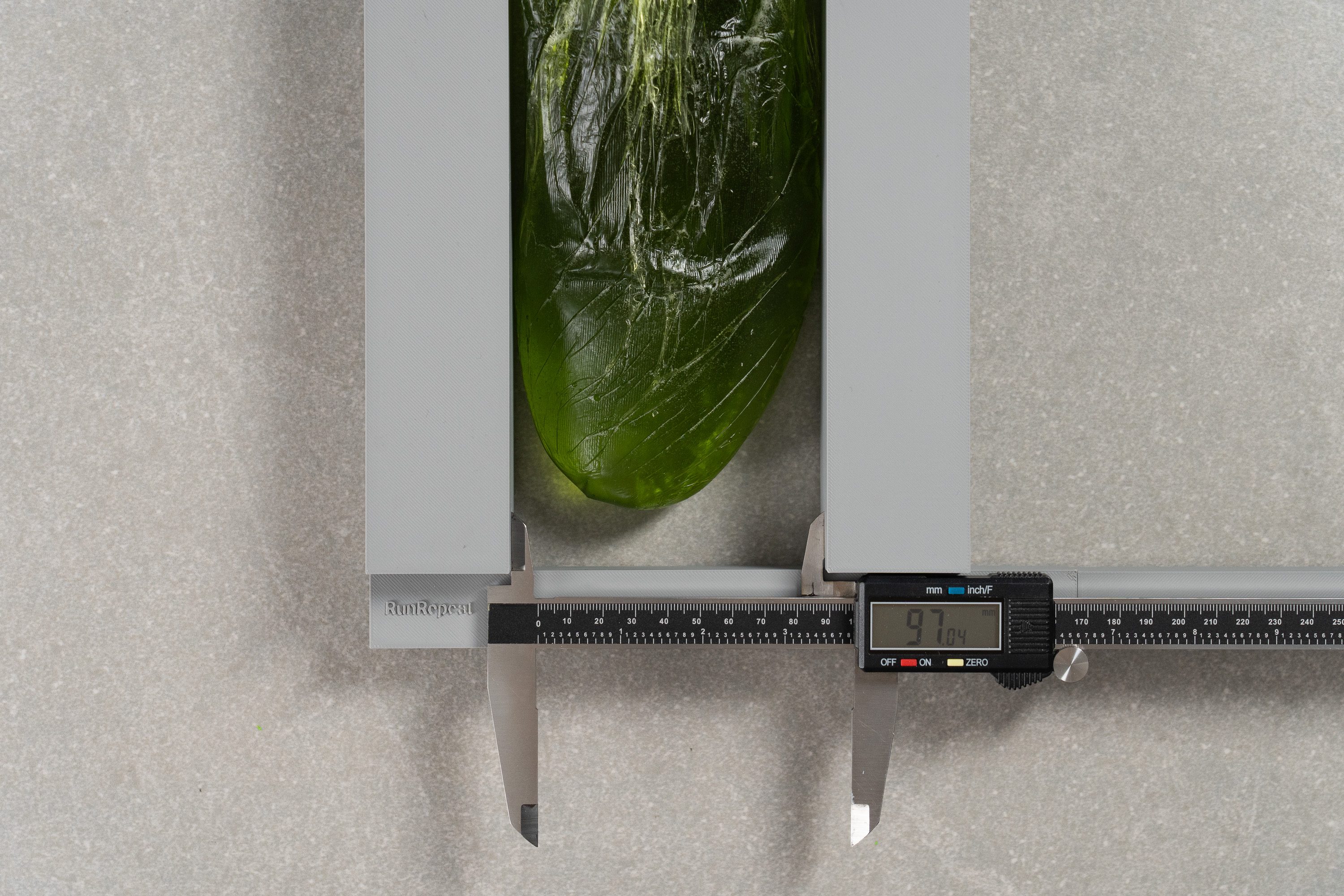
| Hoka Challenger 7 GTX | 97.0 mm |
| Average | 95.6 mm |
Toebox width
Indeed, our caution was justified. Hoka is renowned for crafting tapered designs, and this is a prime example. Measuring just 70.6 mm in the big toe area, there’s almost no room for toe splay, making it better suited for those with narrow feet.
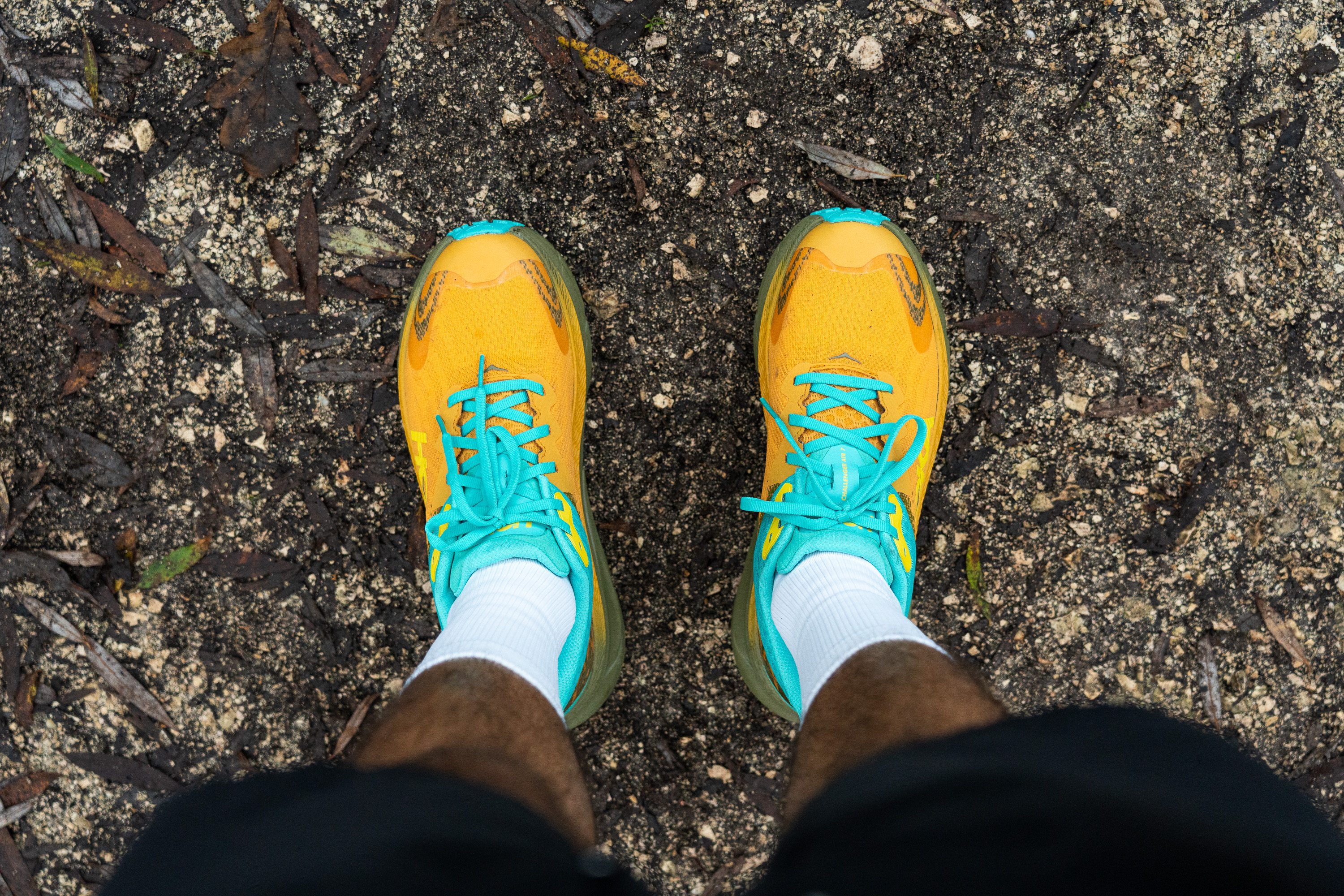
For runners with wider feet, keep in mind that Hoka doesn’t offer the GTX version in a 2E size, though it is available in the regular model. In such cases, your best option might be to go half a size up or, if you're a woman, consider the men’s version if the colorway suits your preferences.
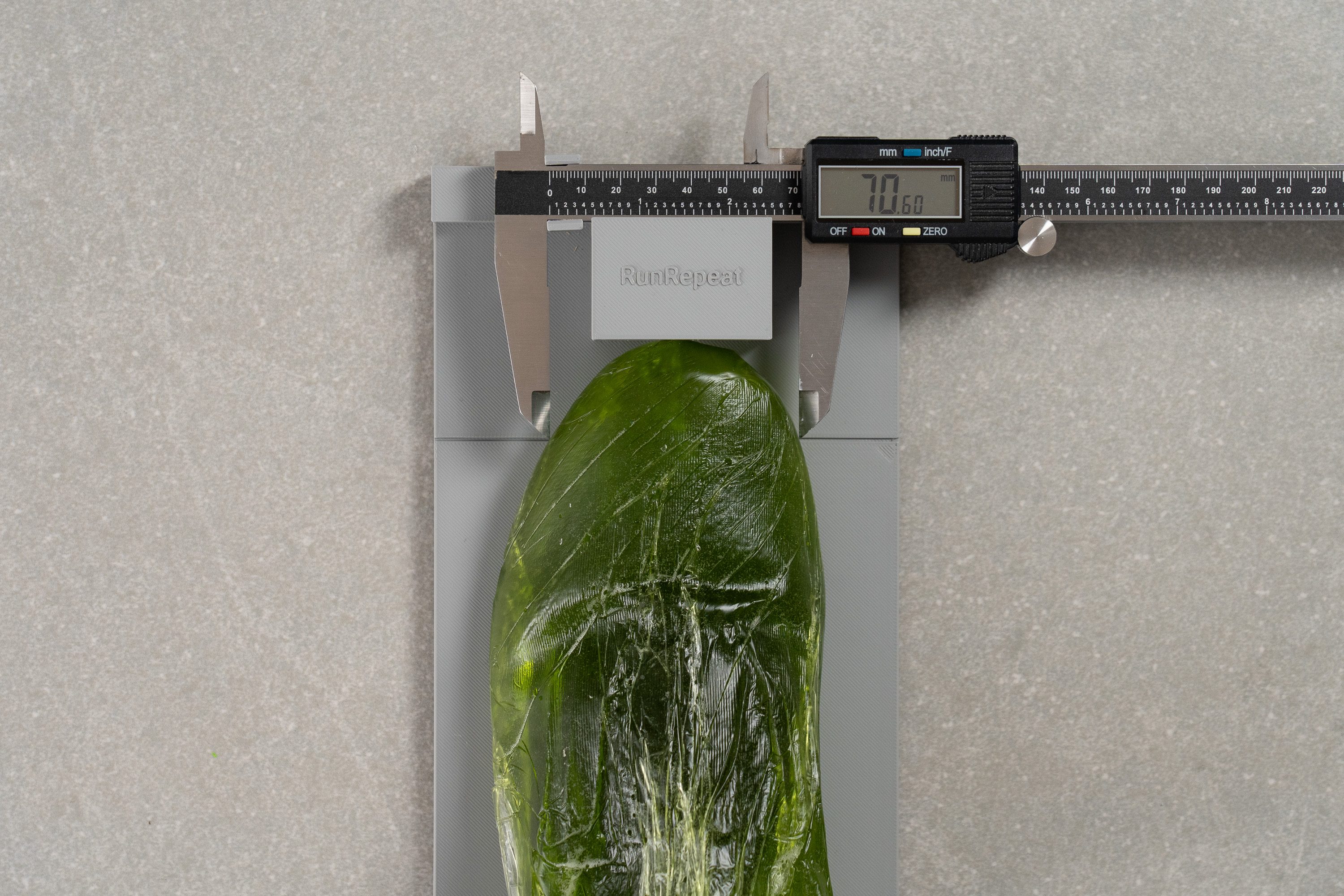
| Hoka Challenger 7 GTX | 70.6 mm |
| Average | 74.6 mm |
Toebox height
And here's another warning: those with high-volume feet must be aware that the Challenger 7 GTX sits pretty low on your toes, with our measurement registering just 24.9 mm.
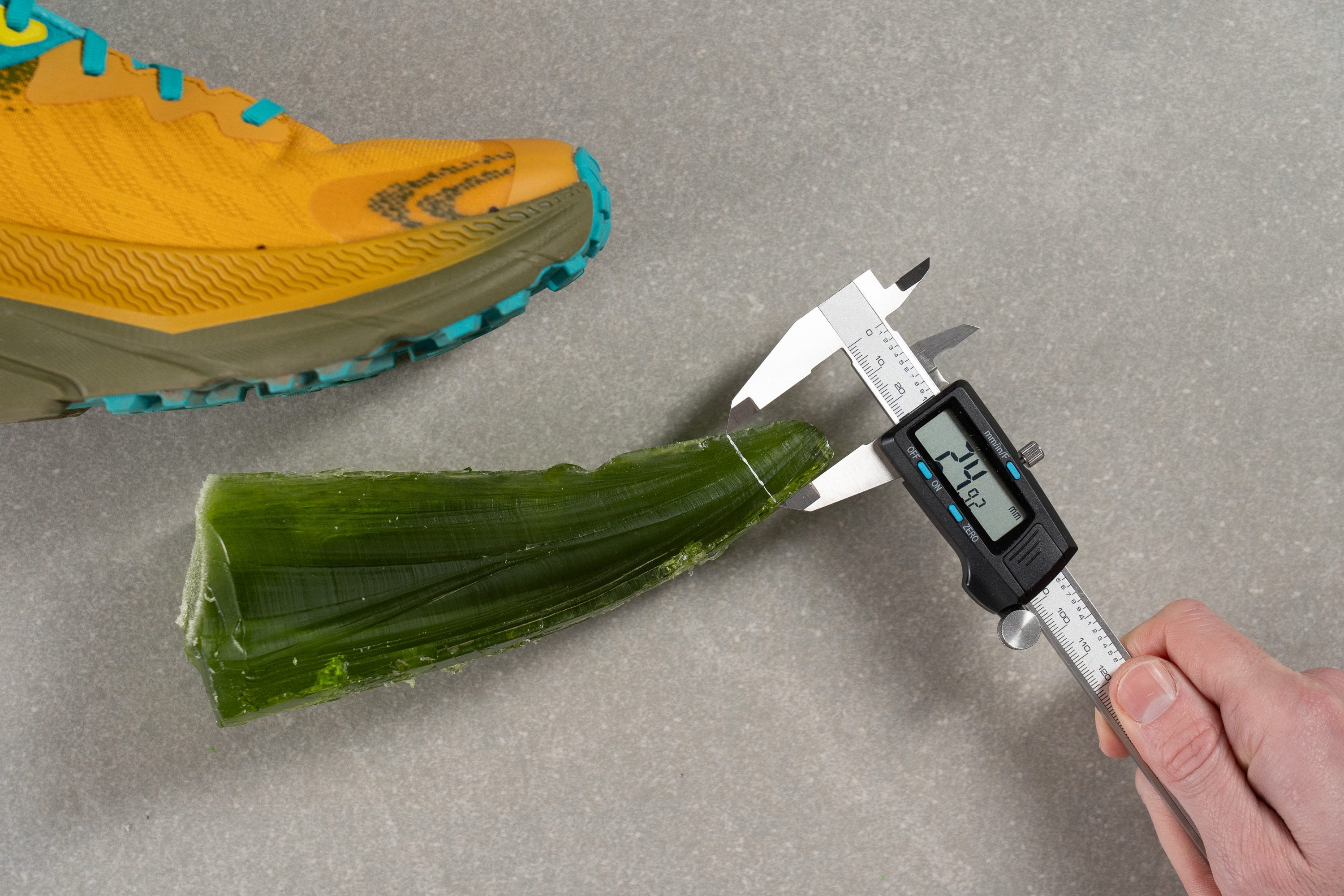
| Hoka Challenger 7 GTX | 24.9 mm |
| Average | 27.0 mm |
Traction / Grip
Lug depth
We took a final look at the outsole to examine the lugs Hoka chose. This time, there's no Vibram outsole, but the Durabrasion rubber, combined with the 3.8-mm lugs used by Hoka, performs really well.
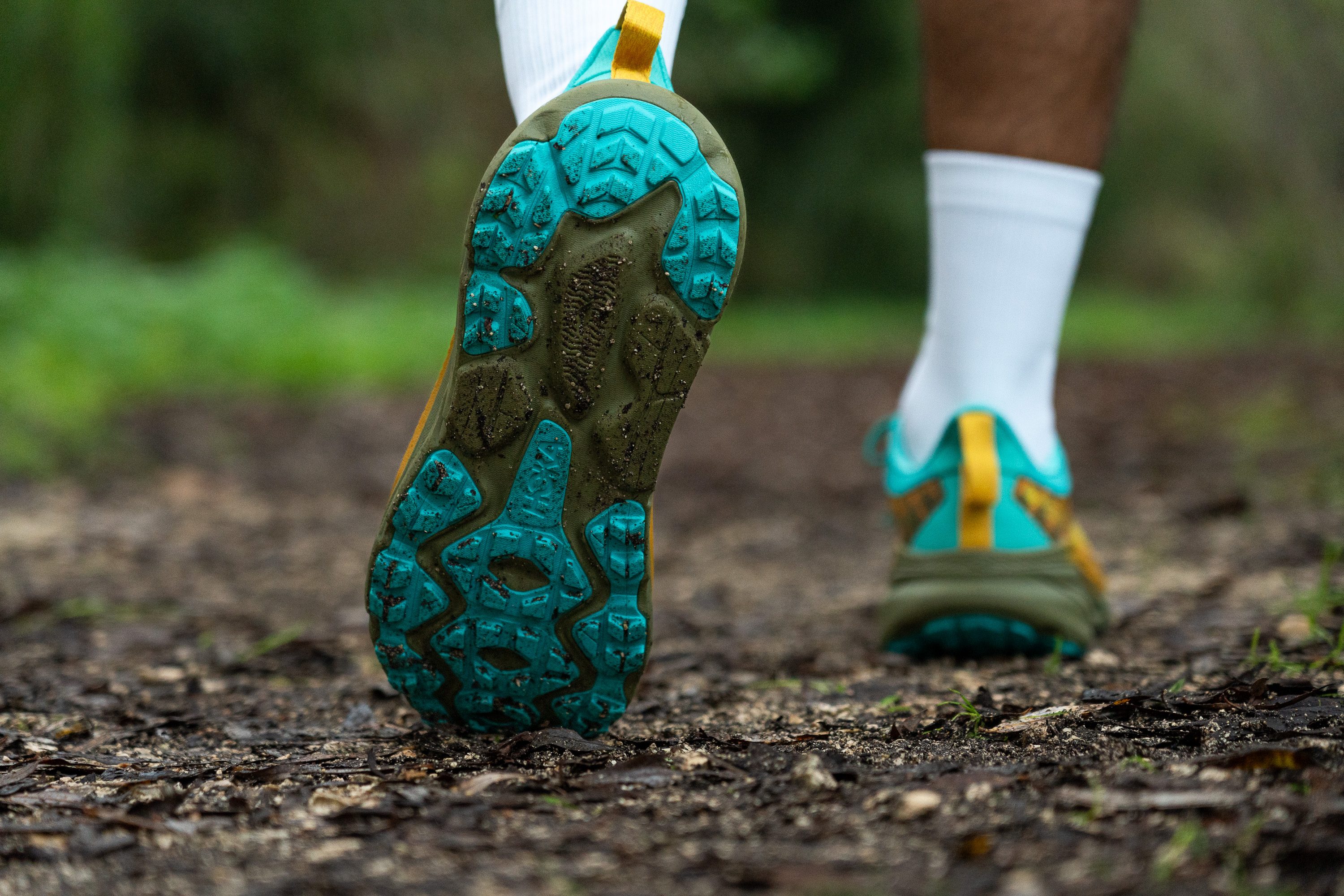
As shown in the picture, there's some exposed foam to reduce weight, yet it's extremely durable, and we have no concerns about it.
The lugs are short as expected, making them suitable for buffed trails or gravel roads. This shoe won't excel in technical, twisted terrain, but Hoka has alternatives for that, like the Zinal 2.
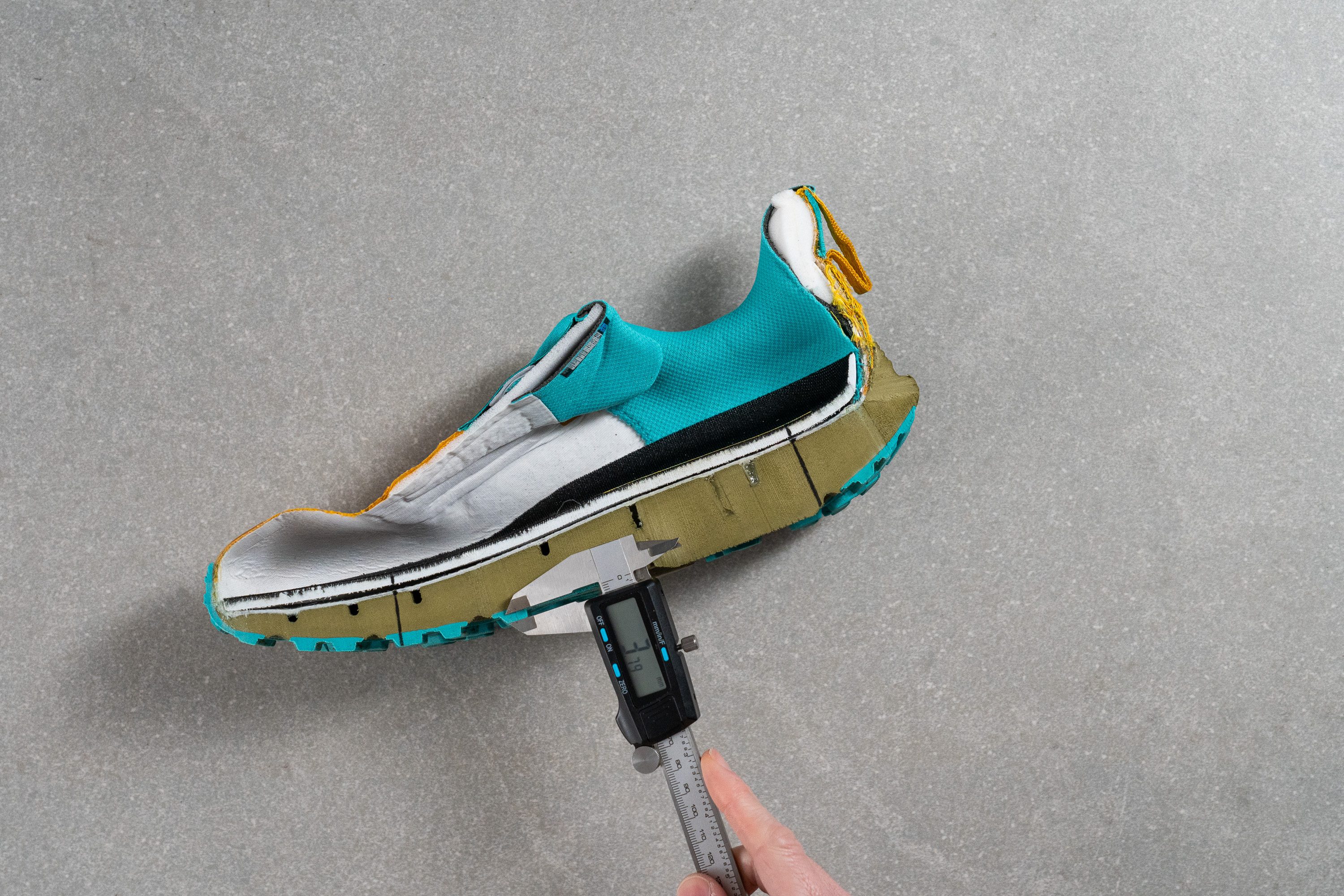
| Hoka Challenger 7 GTX | 3.8 mm |
| Average | 3.5 mm |
Flexibility / Stiffness
Marketed and designed as the perfect all-day, road-to-trail shoe, we anticipated it being a bit more flexible for improved hiking comfort. Yet, the oversized midsole undeniably contributes to increased stiffness.
Therefore, in our stiffness test, where we apply force to bend the shoe to 90 degrees, we recorded a result of 34.5N, which is higher than what we think it should have been.
This test follows an older methodology, which is why you don't see recently tested shoes in the chart. Results from different methodologies can not be compared.
| Hoka Challenger 7 GTX | 34.5N |
| Average | 27.1N |
Stiffness in cold
We performed the same stiffness test under cold temperatures, after leaving the shoe in the freezer for 20 minutes, to see if the underfoot stiffness changed.
In these conditions, the shoe was significantly stiffer, showing a result of 45.0N.
| Hoka Challenger 7 GTX | 45.0N |
| Average | 35.9N |
Stiffness in cold (%)
This marks a 30.6% increase in stiffness, which isn't overly alarming, but it's definitely noticeable.
We had higher expectations for the shoe's performance based on the earlier softness test, but unfortunately, it fell short.
| Hoka Challenger 7 GTX | 31% |
| Average | 32% |
Weight
At 9.9 oz (281g), the Challenger 7 ATR remains reasonably light, even managing to stay under the 10-oz mark. However, this is a noticeable increase from the 8.8 oz (250g) of the non-GTX version. The added weight is understandable though, given the GTX membrane and extra protective layers.
Is it worth the extra 1.1 oz and $15 for increased durability and waterproofness? That depends on your needs...
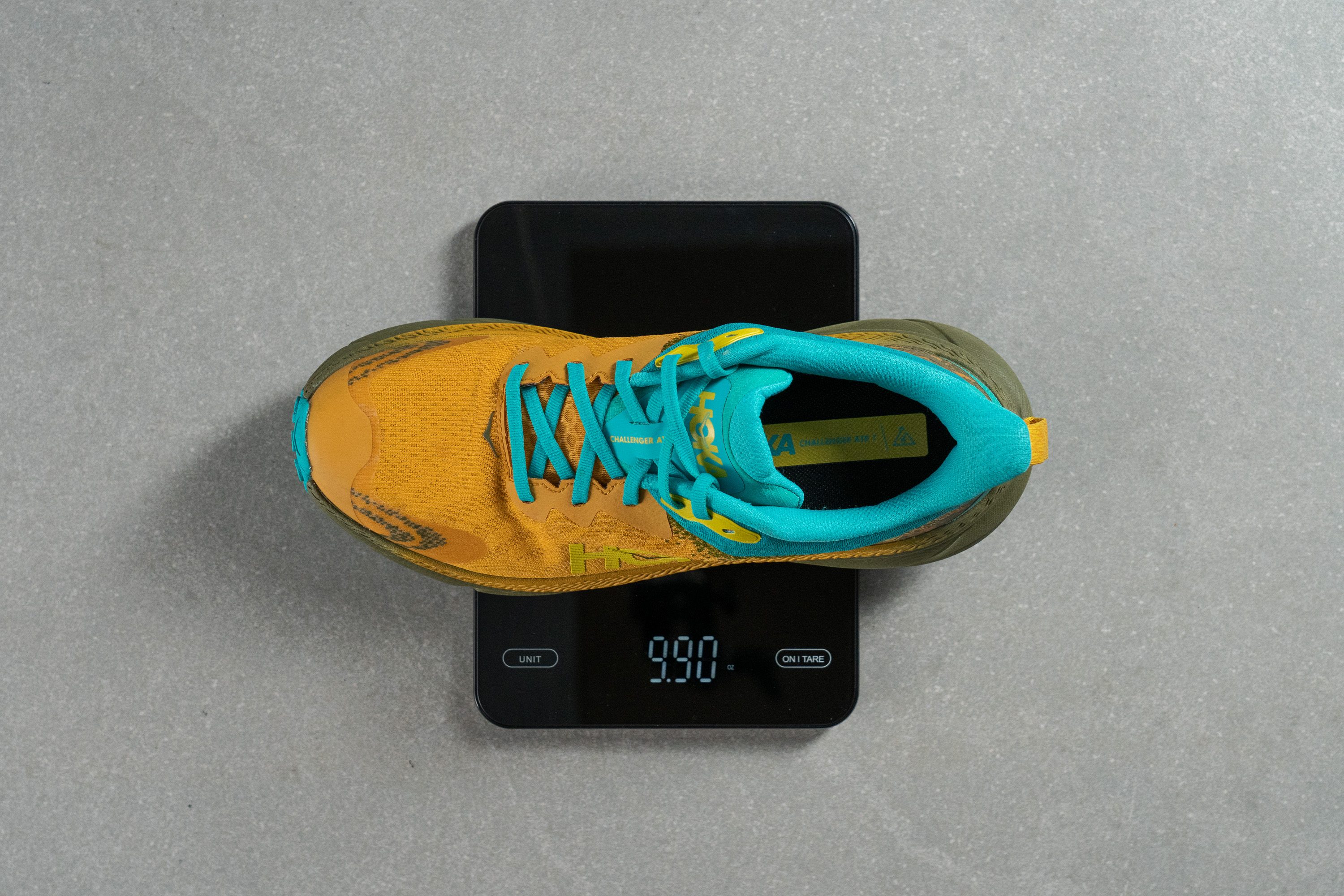
| Hoka Challenger 7 GTX | 9.9 oz (281g) |
| Average | 10.2 oz (289g) |
Breathability
When we tested the regular Hoka Challenger 7, we noted its below-average breathability, scoring just 2 out of 5 in our lab tests. So, we were really surprised to give the Gore-Tex version the same score, as waterproof editions tend to lose some airflow.
The minimal breathability happens mostly through the tongue. However, as seen in our video where we move the shoe over light, there are some breathable spots with fewer reinforcements in the midfoot and toebox.
We then used a microscope to inspect the upper.
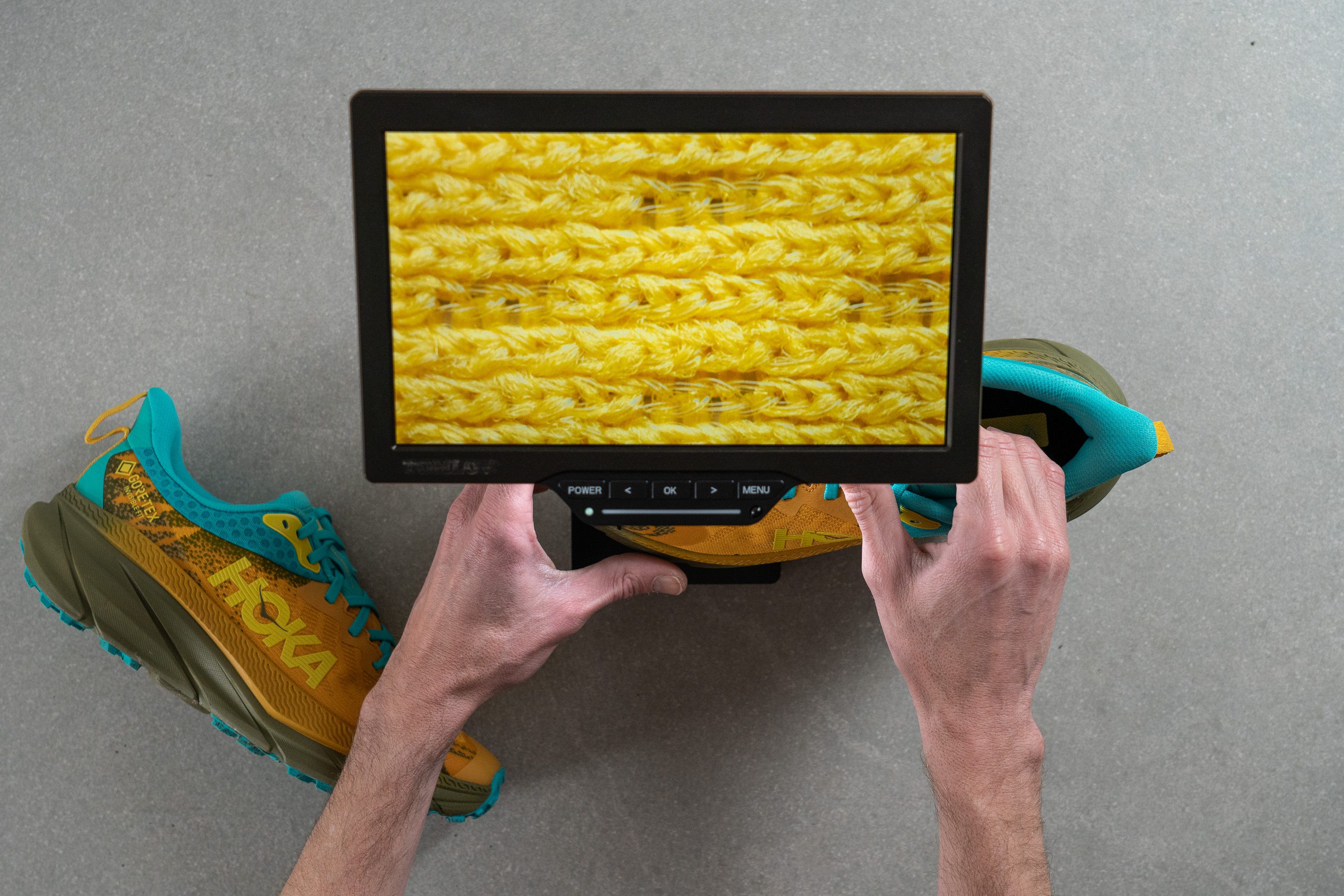
It's made of a thick mesh combined with a Gore-Tex Invisible Fit membrane, consisting of 70% recycled polyester, which is a big plus. And there are some thinner spots here and there to improve airflow.
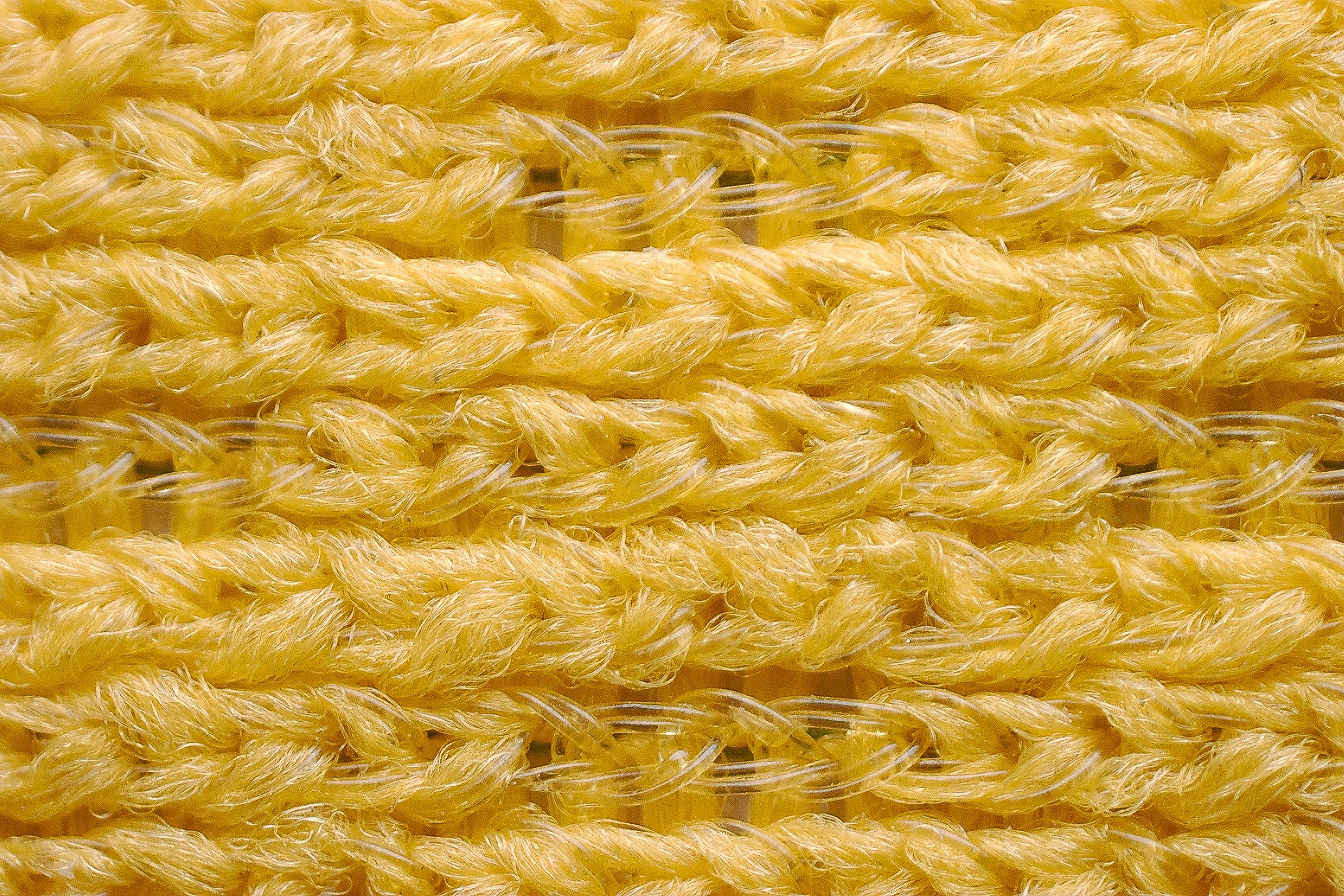
While some shoes place the GTX membrane outside the upper, Hoka integrated it inside.
Thankfully, the upper remains really comfortable and retains all the comfort features of the non-GTX edition.
| Hoka Challenger 7 GTX | 2 |
| Average | 3.3 |
Stability
Lateral stability test
With such a massive stack height, we were curious to see if the shoe would offer a stable ride. In our opinion it should, as it's undeniable that this shoe is designed for neutral runners and for those with mild pronation issues.
It's also true that it provides one of the most stable experiences we've ever had in a trail running shoe. Let's dive into why.
Torsional rigidity
The first and one of the main reasons for this shoe's stability is its tremendous rigidity. We rated it 5 out of 5, similar to a shoe with a stiff rock plate or carbon plate, even though it doesn't have one.
This rigidity forces the shoe to move in a straight line. However, this can be a downside when taking sharp corners or navigating serpentine descents. So, keep that in mind based on the terrain you plan to run on.
| Hoka Challenger 7 GTX | 5 |
| Average | 3.6 |
Heel counter stiffness
The same high rating applies to the heel counter (5 out of 5), which is also crucial in explaining why the shoe feels so controlled. Think of it like a stability shoe in certain aspects—rigidity, heel counter stiffness—but without specific guidance elements like medial posts or guidance pieces.
That's why we see individuals with moderate stability needs using this shoe without any problems, but we still believe it's still best suited for neutral runners.
| Hoka Challenger 7 GTX | 5 |
| Average | 3 |
Midsole width - forefoot
The final source of enhanced stability comes from the midsole. In the forefoot, Hoka opted for a wider than usual design, measuring 116.4 mm in width.
This width boosts stability but does make the shoe slightly clunkier. However, this is minor compared to the heel...
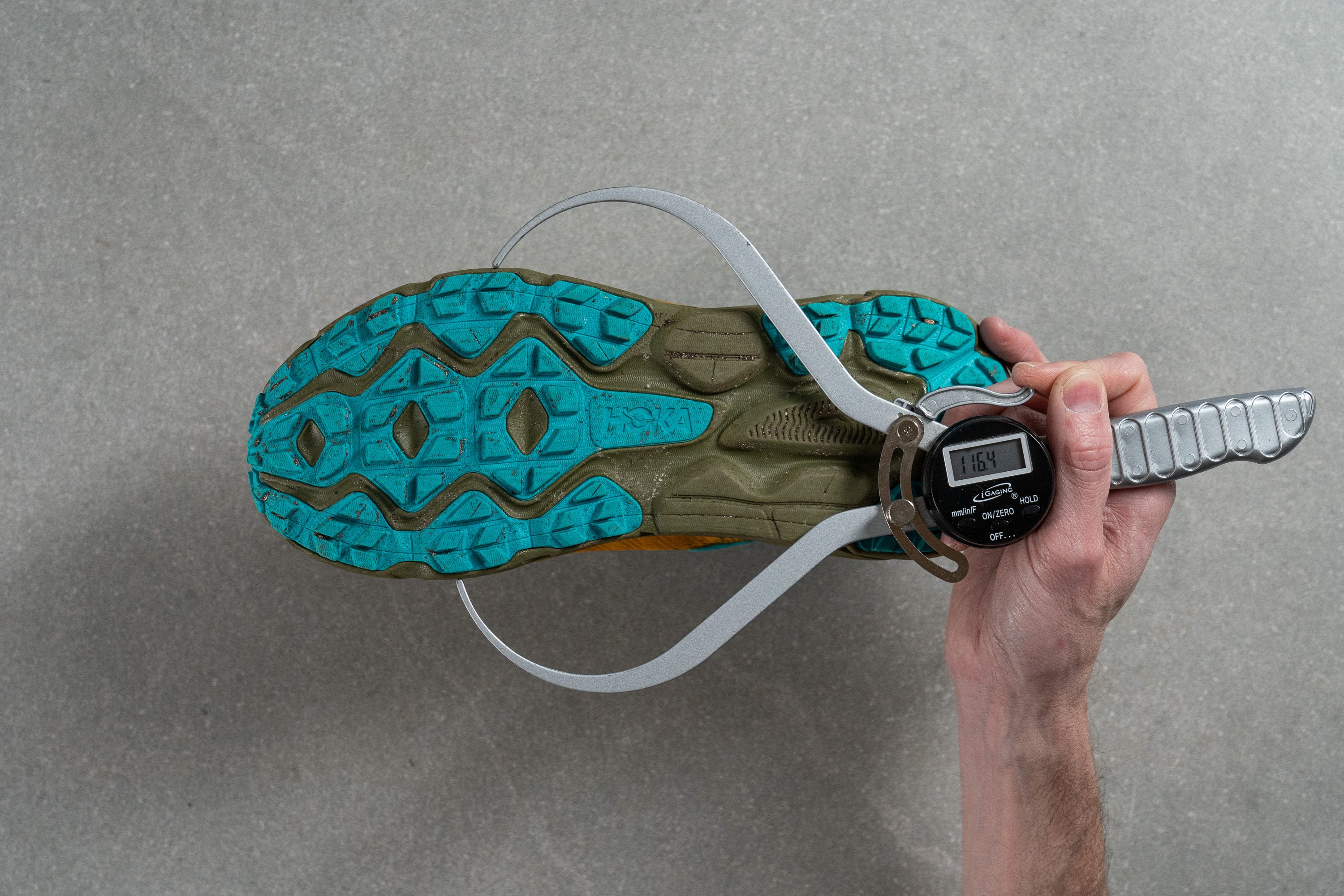
| Hoka Challenger 7 GTX | 116.4 mm |
| Average | 112.8 mm |
Midsole width - heel
The heel dimensions are enormous at 100.9 mm, similar to most stability shoes like the Hoka Gaviota 5.
Combining the shoe's rigidity, the sturdy heel counter, the midsole's dimensions, and the significant drop results in a shoe that even heel strikers with high stability needs can use.
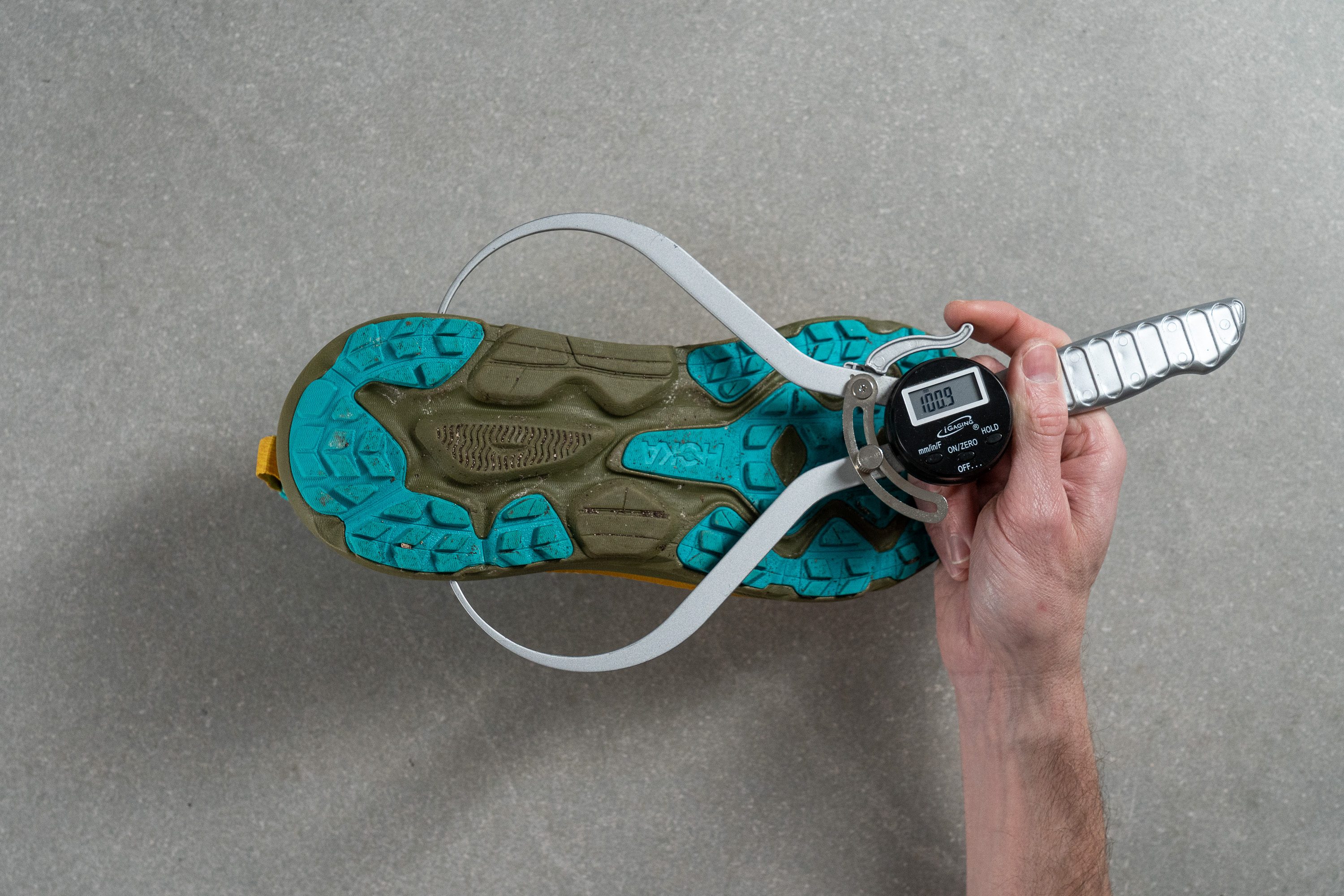
| Hoka Challenger 7 GTX | 100.9 mm |
| Average | 89.9 mm |
Durability
Toebox durability
The Challenger 7 GTX, a lightweight shoe, impressively packs a solid amount of protective layers in the upper, earning a perfect 5 out of 5 in our initial Dremel test. And it's worth mentioning that this robust TPU layer that enabled the perfect score is absent in the regular edition.
Sure, the results might have varied in the mesh area, but we're committed to maintaining standardized testing. That's why we test the exact same spot on every shoe, applying the same force and RPM, to ensure consistency and fairness.
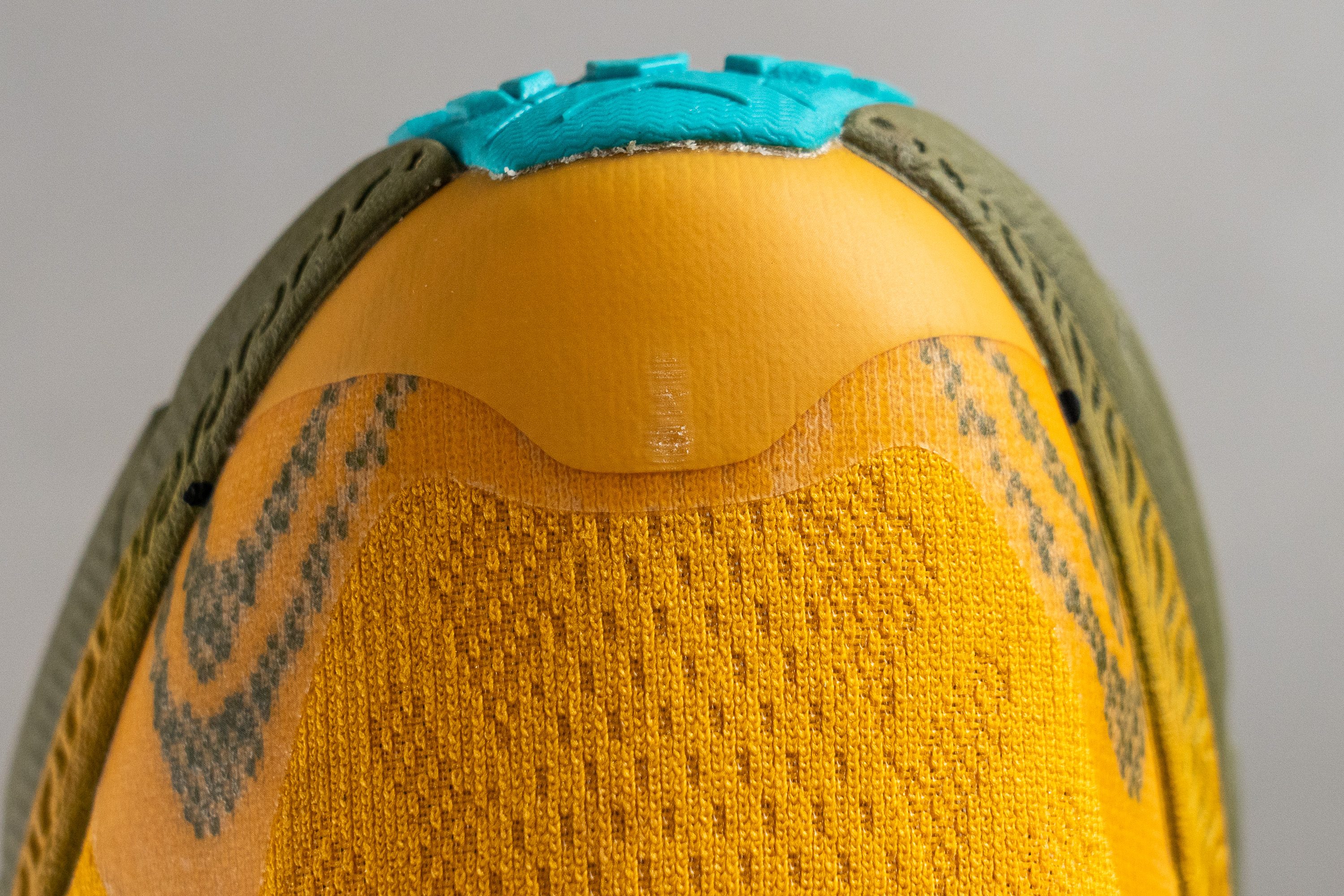
| Hoka Challenger 7 GTX | 5 |
| Average | 3.1 |
Heel padding durability
The heel isn't quite as durable, as it scored a 3 out of 5 in our second Dremel test.
However, this result is by no means disappointing—in fact, it surpasses the performance of the average trail running shoe.
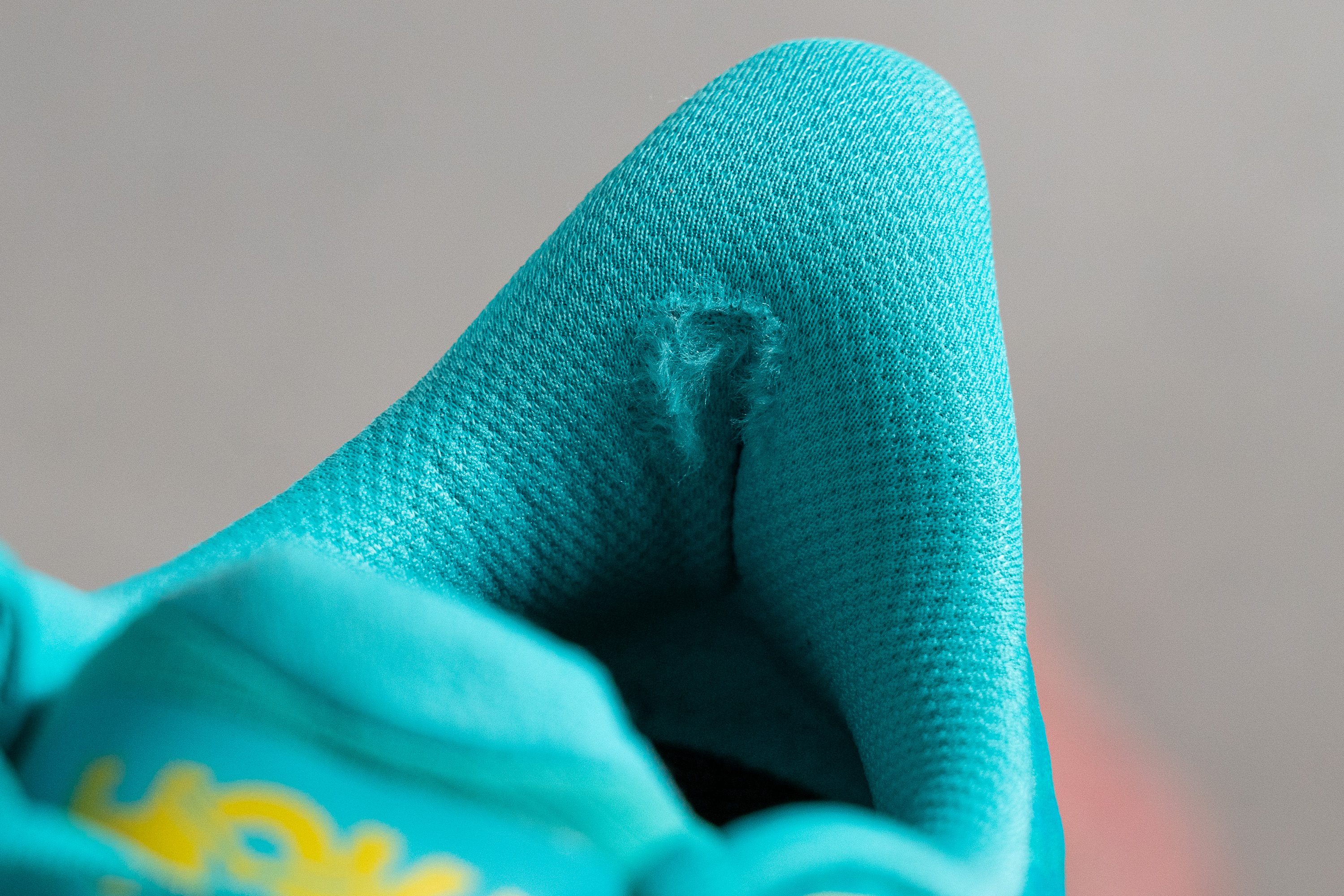
| Hoka Challenger 7 GTX | 3 |
| Average | 3 |
Outsole hardness
Hoka has consistently struck the right balance between road and trail performance with the Challenger series outsole, and the 7th edition is no exception.
It features the same Durabrasion rubber we saw in the regular version. With a hardness of 81.0 HC, it's a great approach, ensuring a good amount of grip without sacrificing too much durability.
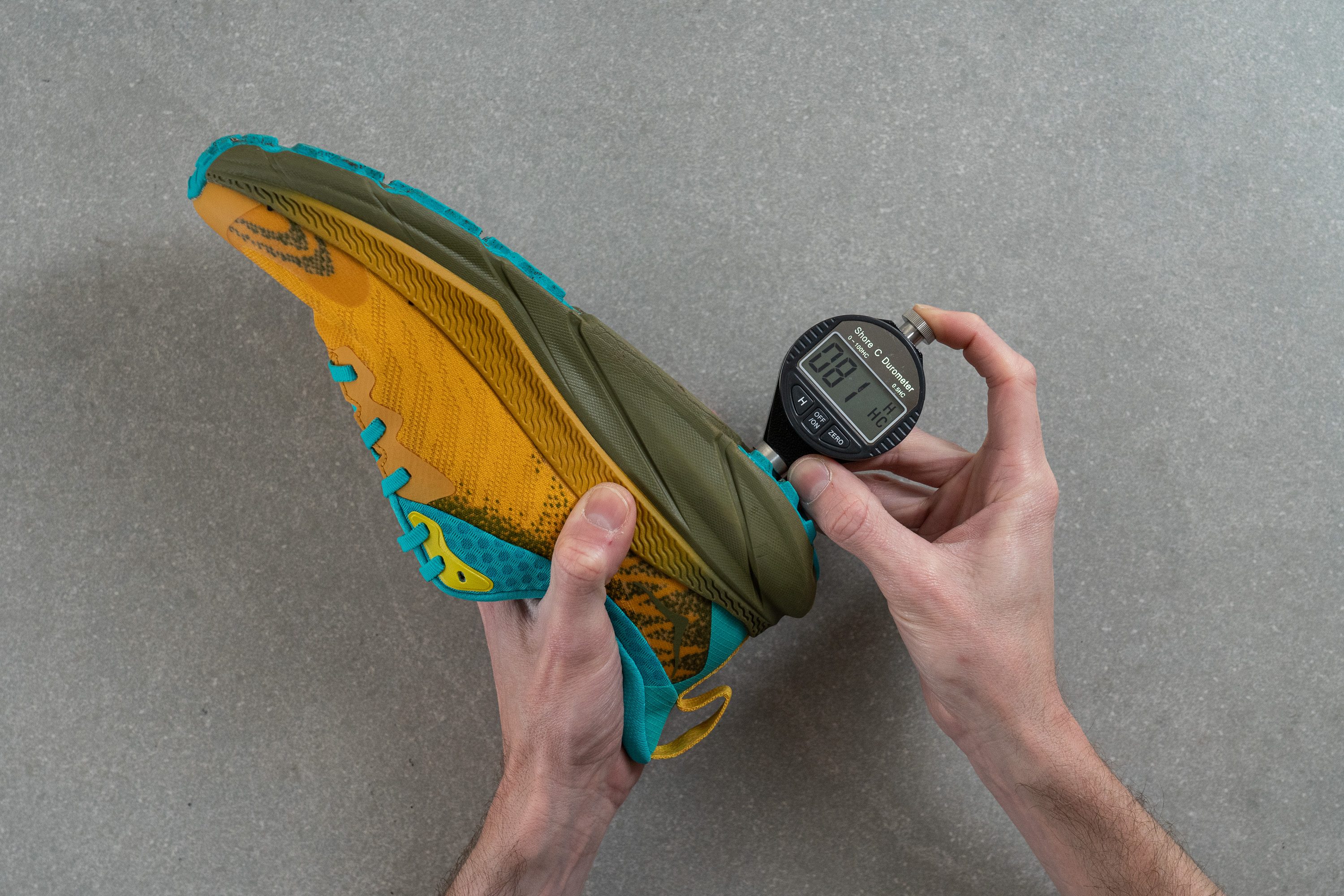
| Hoka Challenger 7 GTX | 81.0 HC |
| Average | 85.8 HC |
Outsole durability
Given its hardness, we expected at least average durability, and that's precisely what the Challenger 7 GTX delivered in our lab tests.
After our final Dremel test—enough for today—we observed a 0.8-mm indentation, a solid result for this shoe.
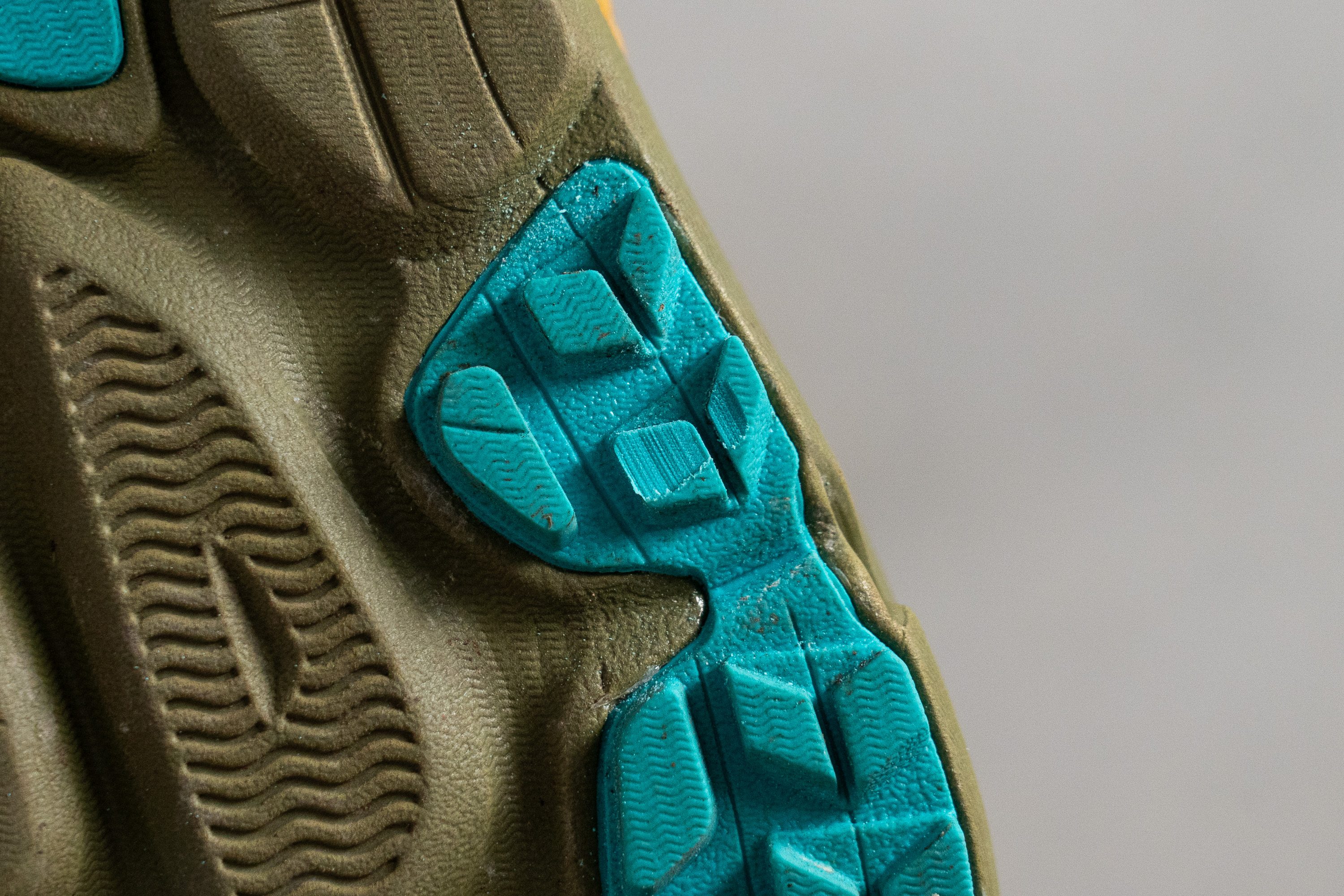
| Hoka Challenger 7 GTX | 0.8 mm |
| Average | 0.9 mm |
Outsole thickness
With an outsole thickness of 2.1 mm, we anticipate no trouble here, even after many hundreds of miles. This durability is thanks to the substantial lugs on top of the rubber, which we'll cover later in this review.
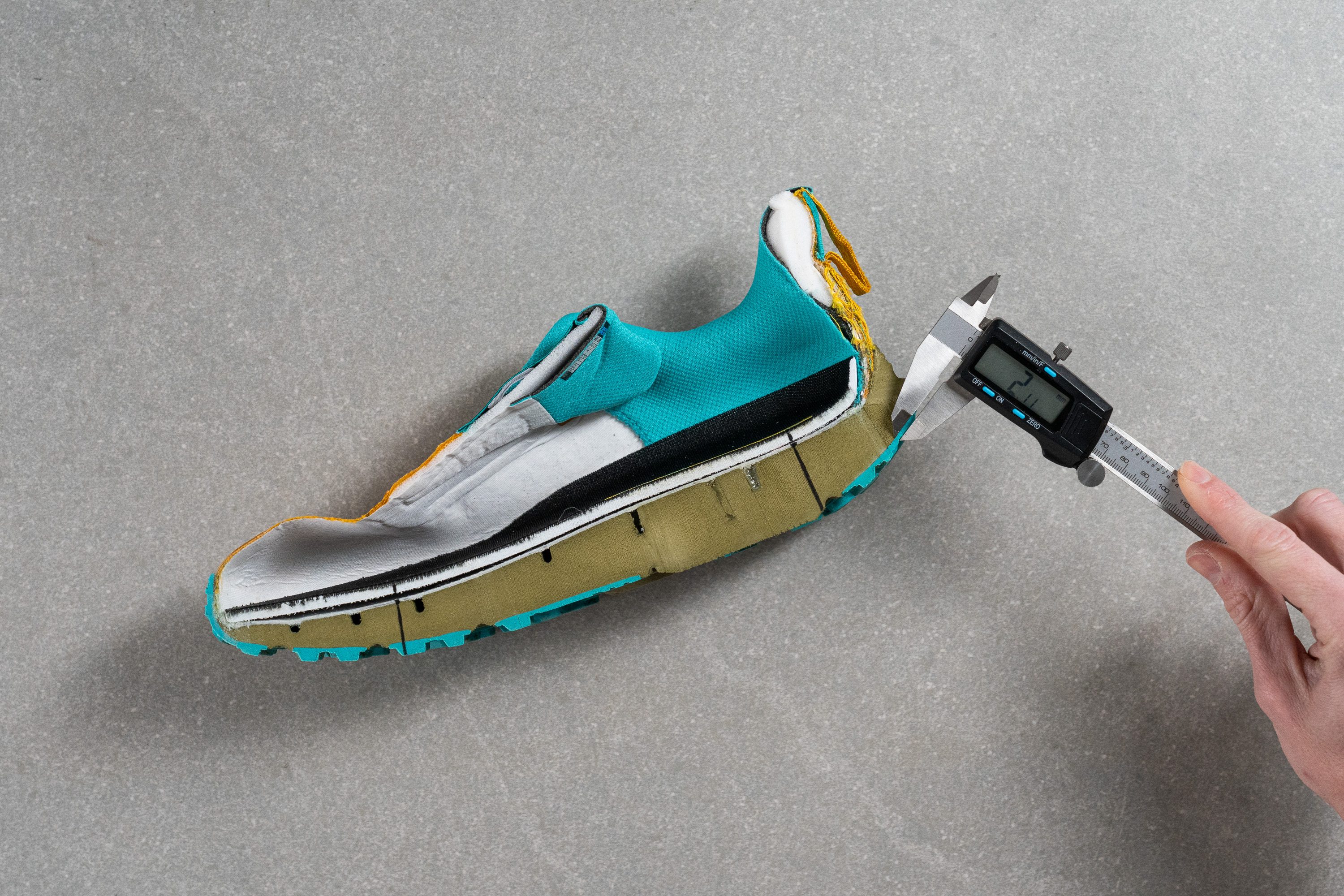
| Hoka Challenger 7 GTX | 2.1 mm |
| Average | 2.2 mm |
Misc
Insole thickness
The insole is average, measuring 5.0 mm. It's made of plain EVA and offers enough comfort, with nothing negative to note about it.
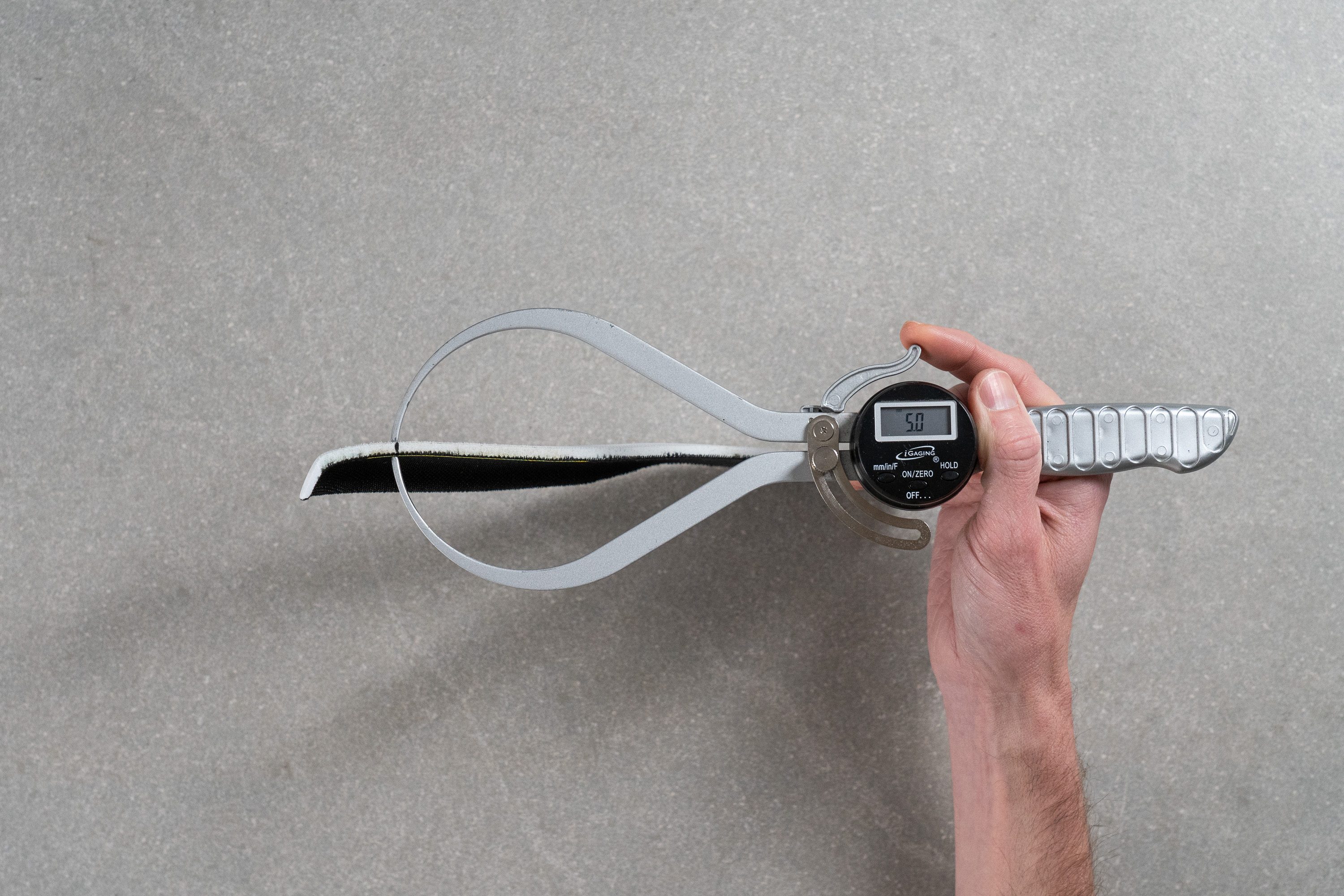
| Hoka Challenger 7 GTX | 5.0 mm |
| Average | 4.7 mm |
Removable insole
The Challenger 7 GTX features a standard insole that's easy to remove and replace if needed. Thanks to the shoe's standard dimensions, fitting third-party insoles is 100% hassle-free.
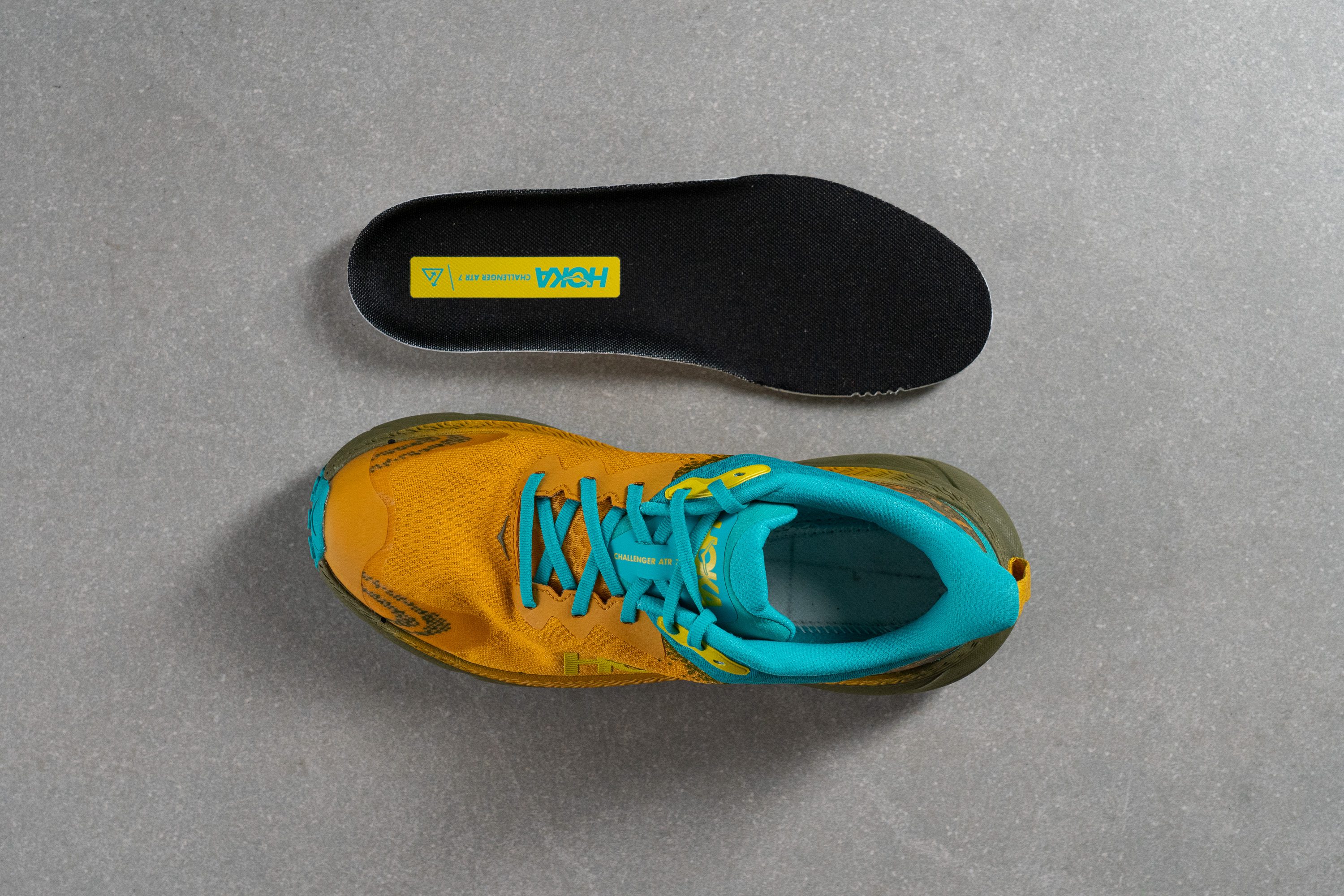
| Hoka Challenger 7 GTX | Yes |
Midsole softness in cold
We then froze the shoe for 20 minutes next to our ice creams and re-tested it to evaluate its softness in cold temperatures.
The result? A hardness of 21.4 HA, which is pretty similar.
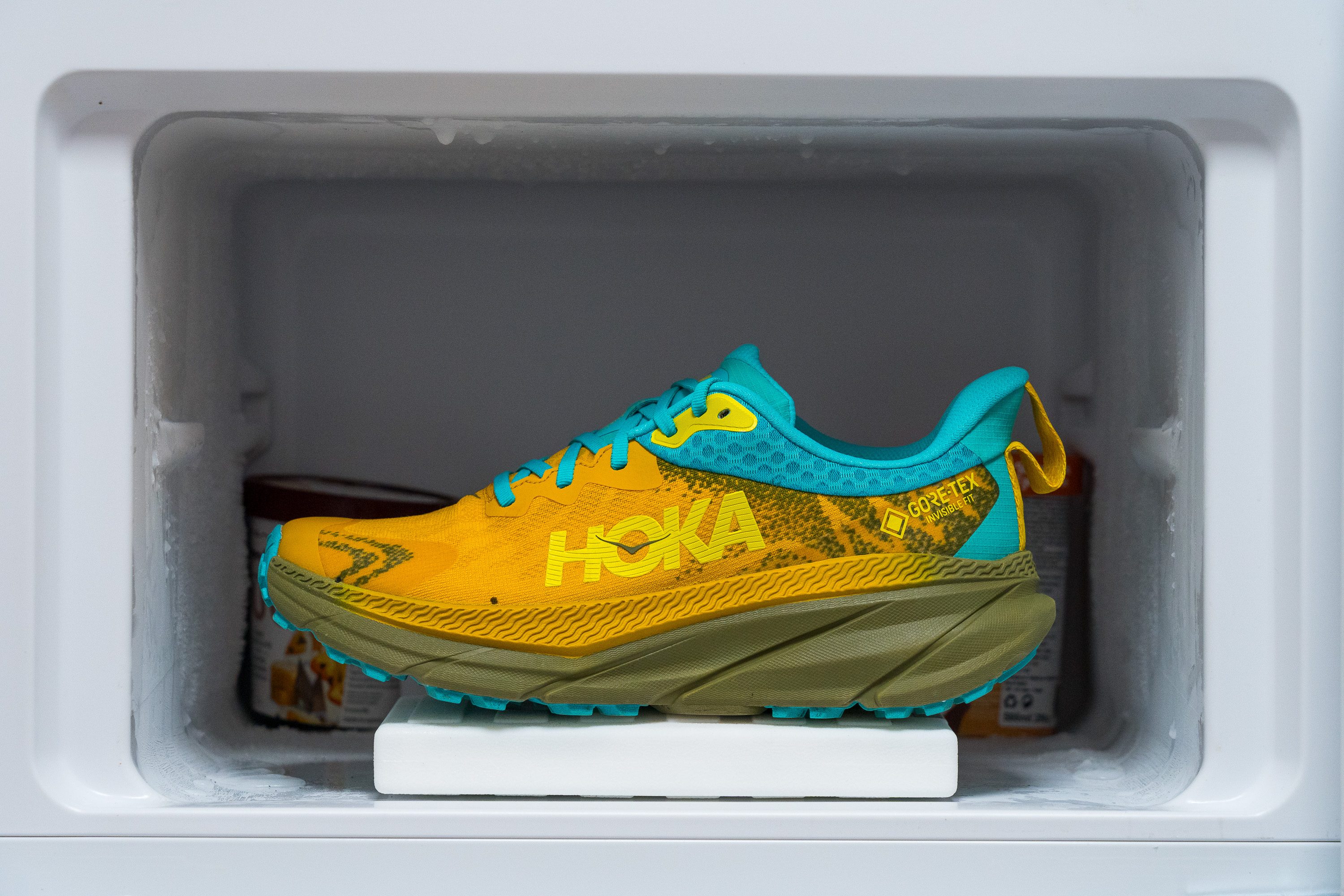
| Hoka Challenger 7 GTX | 21.4 HA |
| Average | 27.4 HA |
Midsole softness in cold (%)
Actually, it's just a 9.7% change, which is pretty minor and right up there with the best foams on the market.
This also means no matter how cold it gets outside, you've got a shoe that'll give a solid performance... and one less excuse to skip the workout!
| Hoka Challenger 7 GTX | 10% |
| Average | 26% |
Reflective elements
A notable disappointment with the shoe is its absence of reflective elements. Considering that the Challenger is designed for all-day wear, the likelihood of using it at night isn't exactly rare, right?
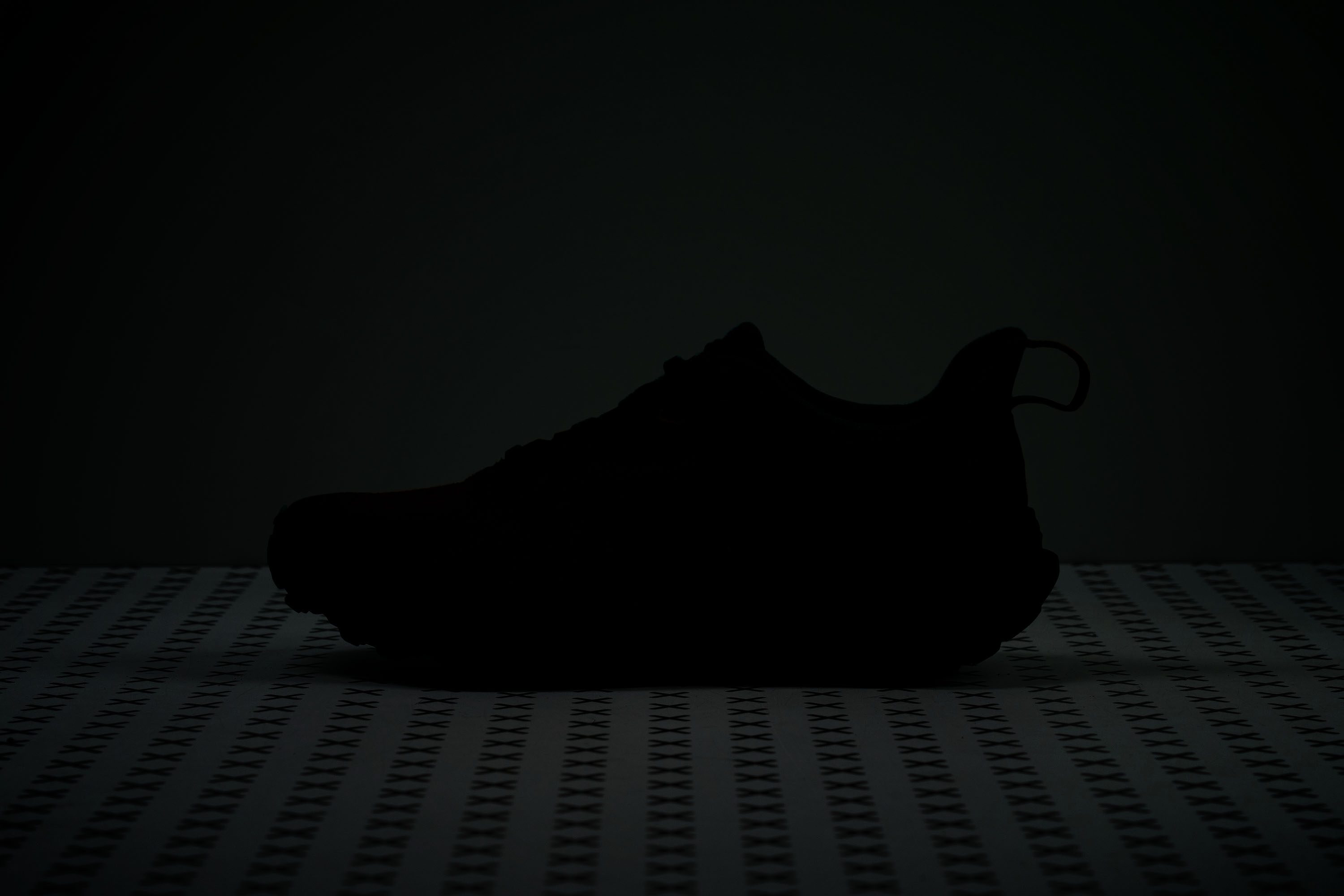
| Hoka Challenger 7 GTX | No |
Tongue padding
With 6.1 mm of padding, Hoka made the right call by using just one slab of foam at an average thickness.
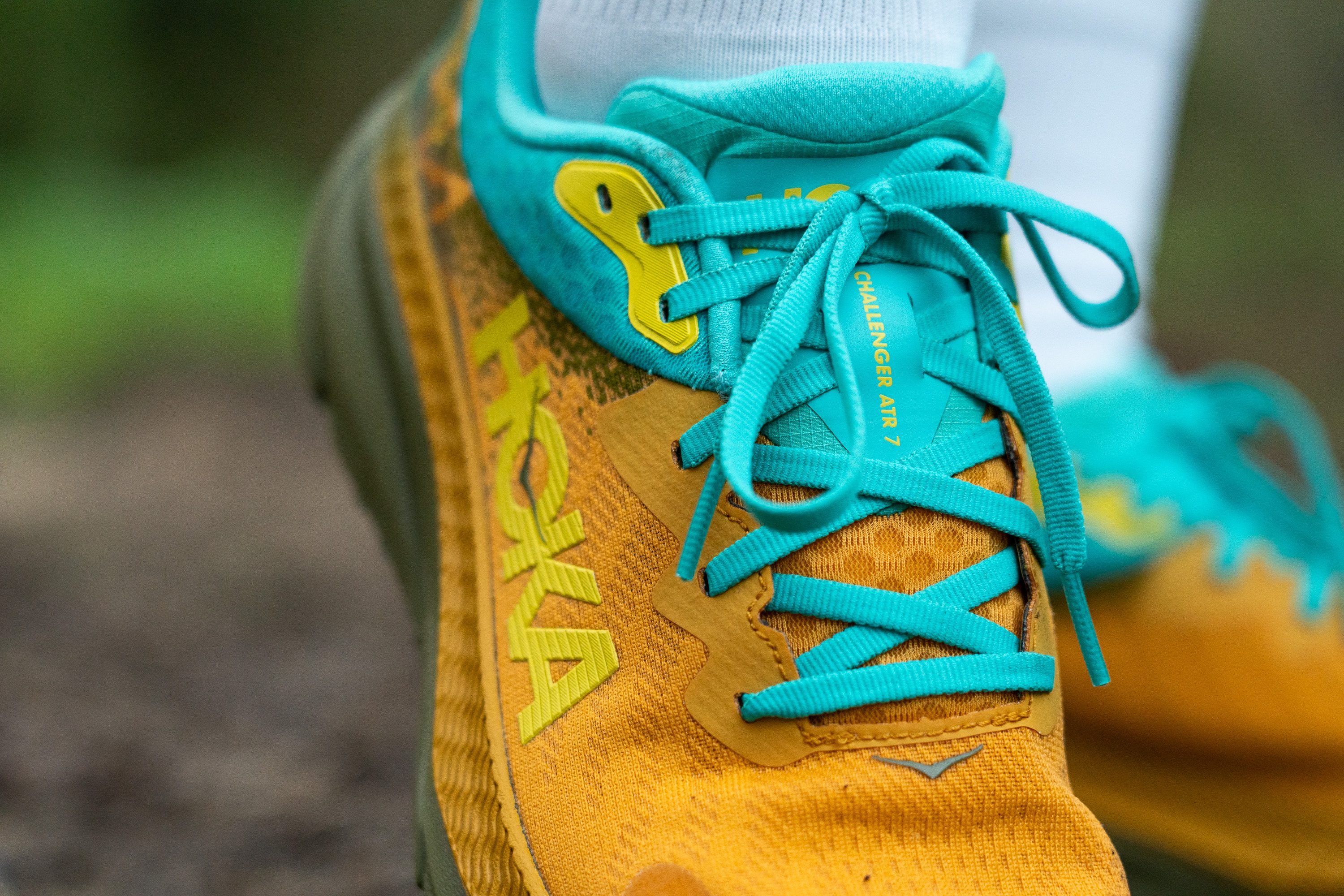
Less than that might have been too performance-oriented and potentially uncomfortable, while more could have risked adding too much weight to a shoe that already gained an ounce over the standard version.
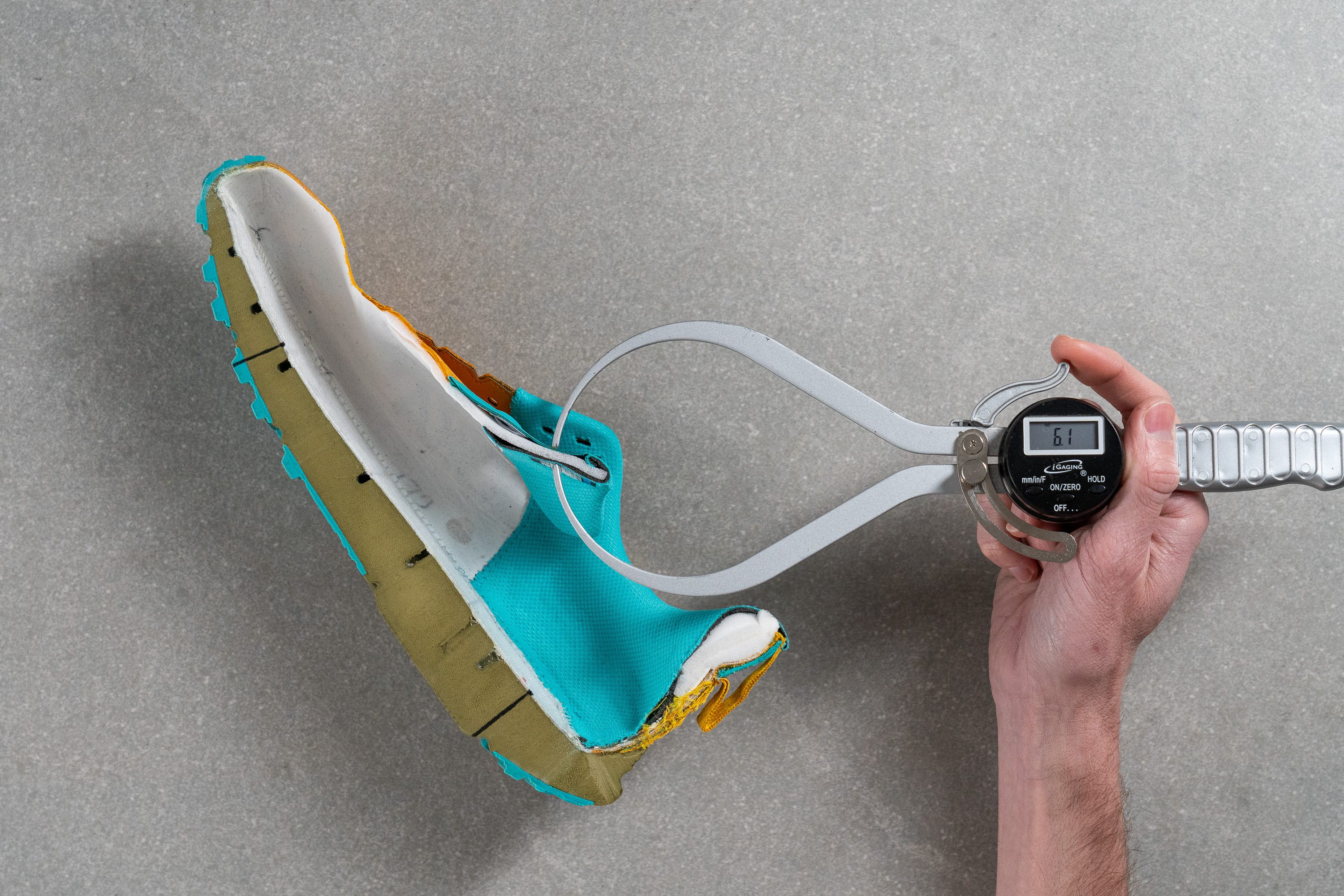
| Hoka Challenger 7 GTX | 6.1 mm |
| Average | 6.4 mm |
Tongue: gusset type
The tongue of the Challenger 7 ATR is gusseted and fully attached to the sides, a must-have feature in any trail shoe but even more crucial in a Gore-Tex-equipped shoe where full protection from water is the goal.
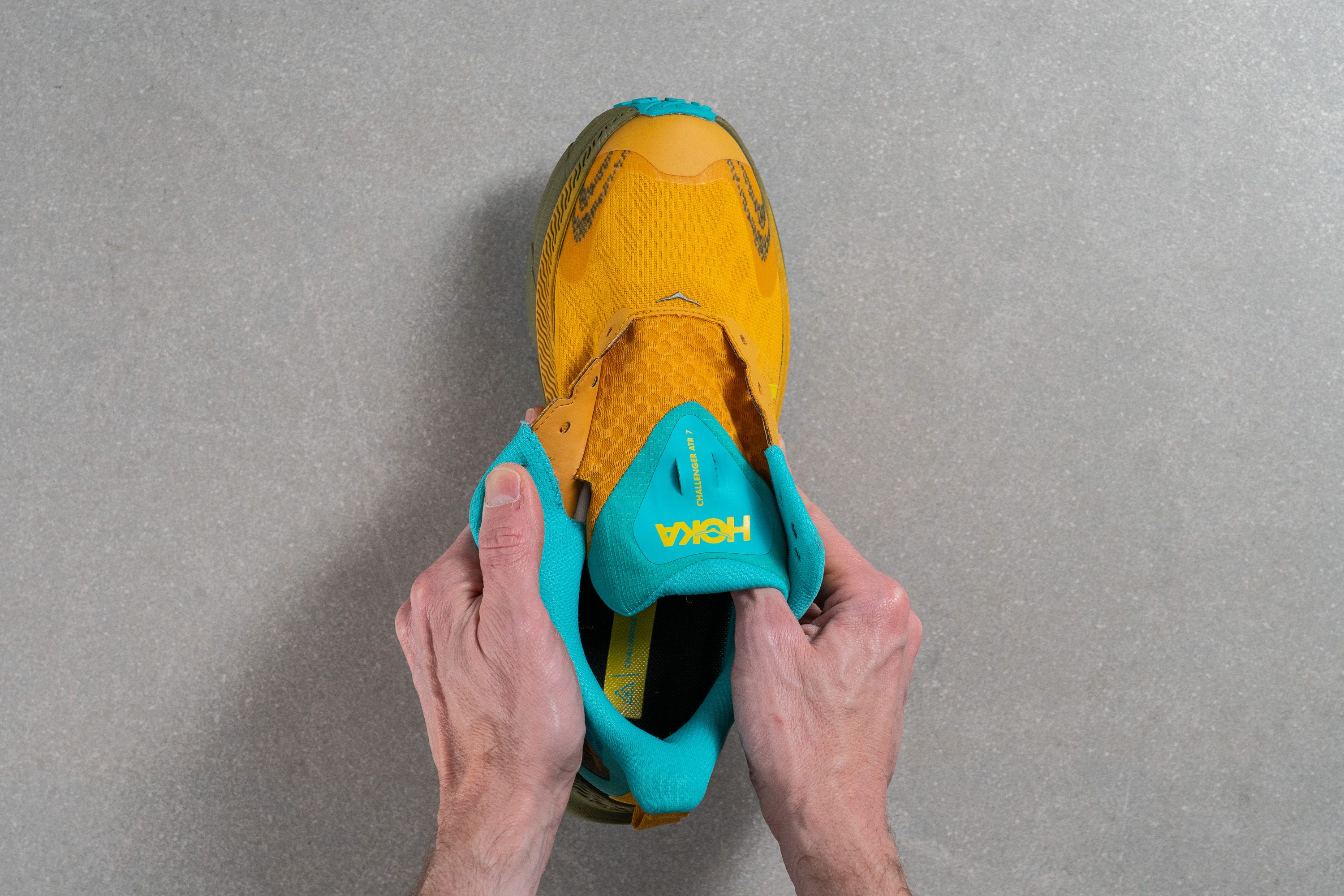
| Hoka Challenger 7 GTX | Both sides (full) |
Heel tab
The heel features a finger-loop tab, which appears to serve more as a style element than a functional one.
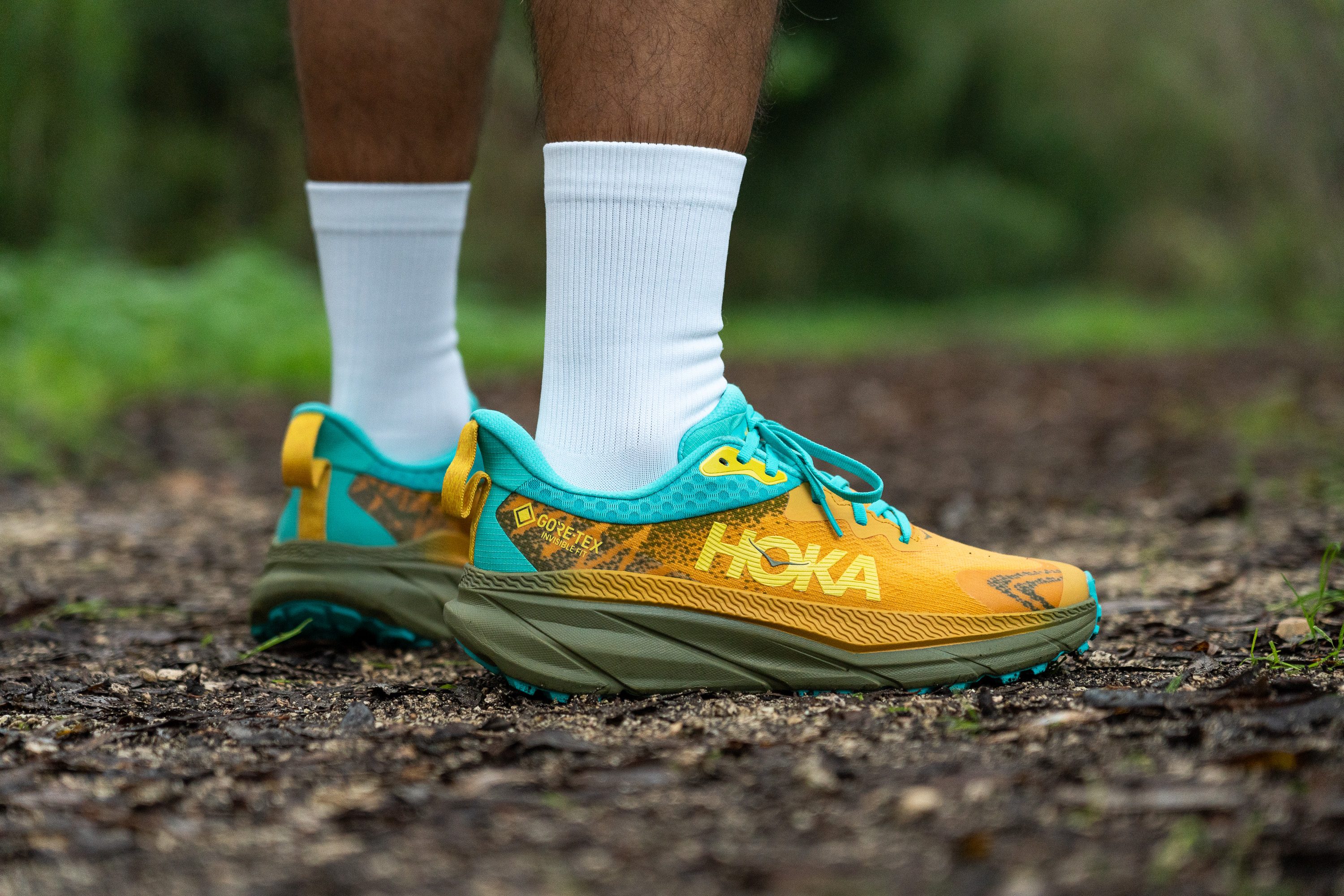
| Hoka Challenger 7 GTX | Finger loop |

